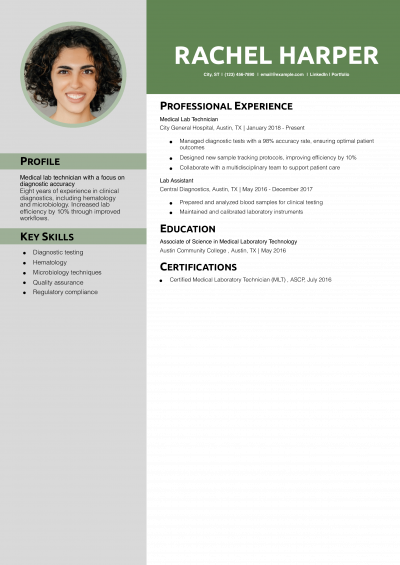Military members serve the country in various ways, across a wide range of occupations both overseas and on the homefront. The content of your resume will vary depending on your field. Every military resume must demonstrate how your experience and transferable skills can help you meet the demands of the job. We’ll help you create a resume that shows hiring managers how your past experiences and service have laid a strong foundation for new job opportunities.
Key takeaways:
- Emphasize specializations: Quickly highlight your military specialties, such as disaster preparedness, tactical strategy, or supply chain logistics.
- Detail quantifiable achievements: Use specific numbers and outcomes to illustrate your impact in previous military roles, such as directing the distribution of over 10,000 units of munitions and 5,000 units of medical supplies.
- Use keywords for ATS: Include relevant skills and keywords from the job posting in your resume to ensure it passes through Applicant Tracking Systems (ATS) and reaches hiring managers.
Most Popular Military Resumes
Military-to-Civilian Transition Resume Example
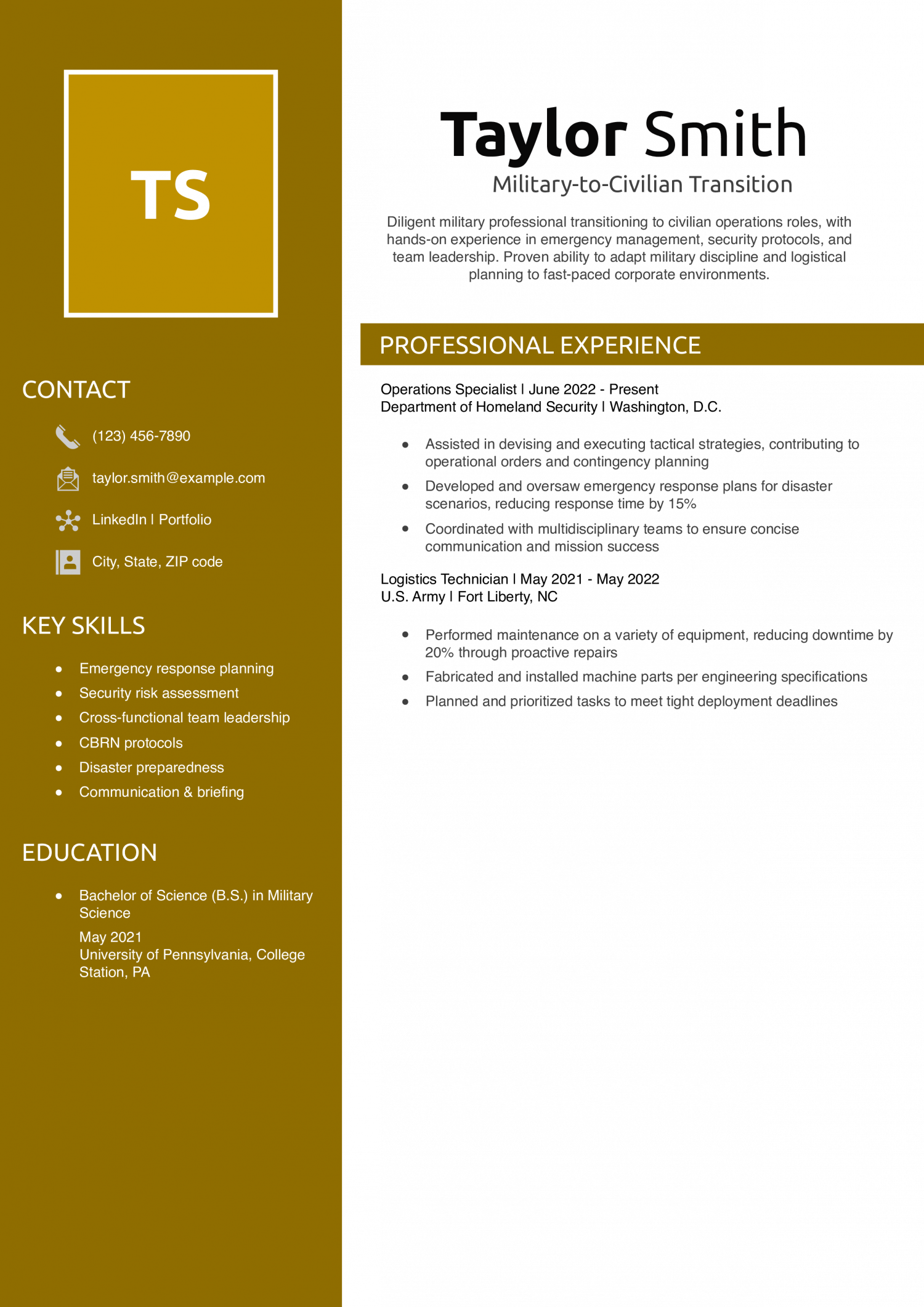
Why This Resume Is a Great Example
Taylor’s resume seamlessly translates mission-critical military operations into civilian emergency-management competencies, showcasing both hands-on technical skills and leadership under pressure. The reverse-chronological format makes it easy for hiring managers to see Taylor’s most recent and most relevant achievements first.
Key Tips
Emphasize how military-grade planning and execution translate to civilian operations roles to highlight transferable value. For guidance on presenting non-traditional backgrounds, check out How to Make a Resume.
Air Force Logistics Specialist Resume Example
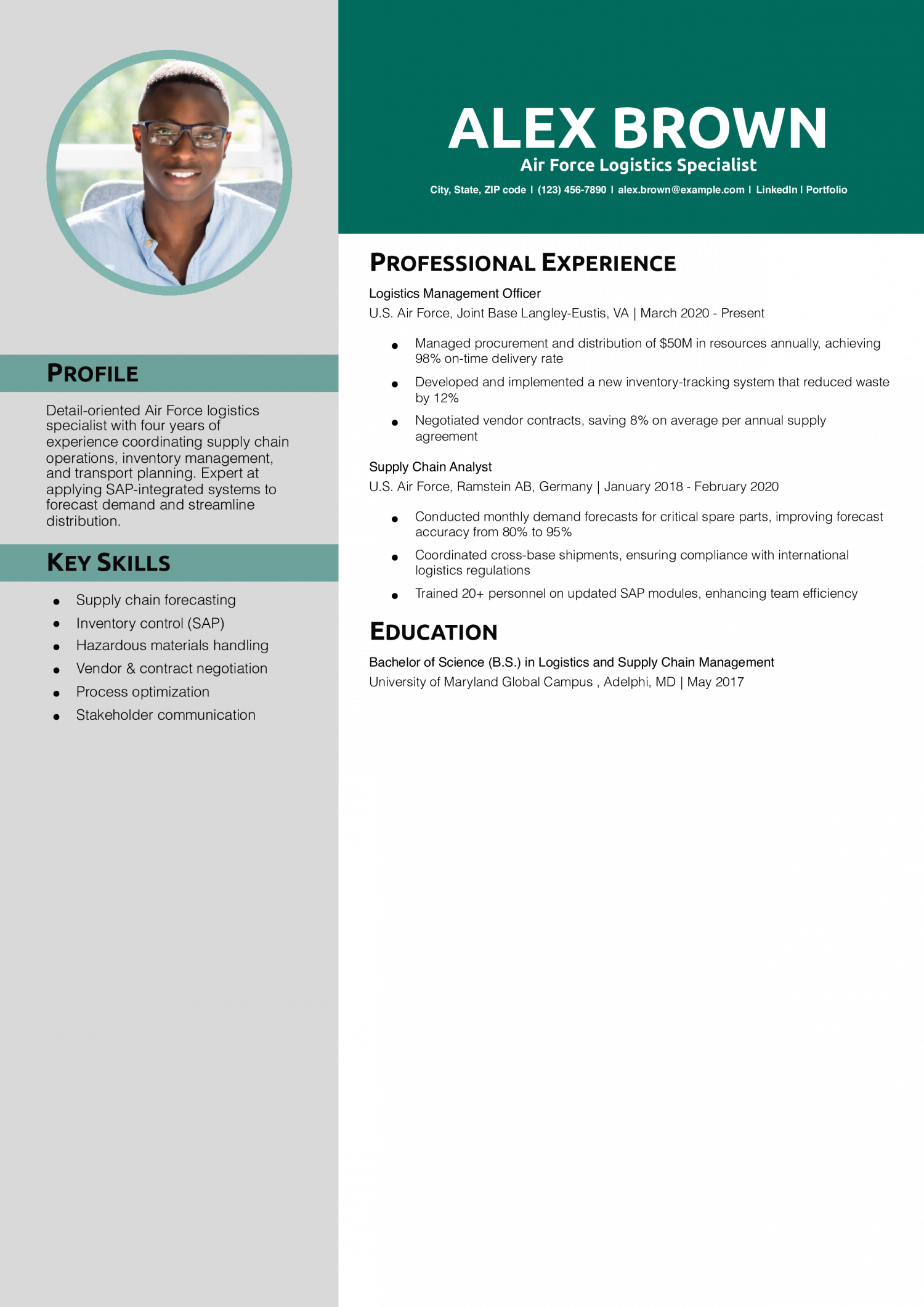
Why This Resume Is a Great Example
Alex’s resume quantifies large-scale logistics outcomes, like $50M in annual resources and 98% delivery rates, demonstrating clear business impact. The dual focus on technical systems (SAP) and people-management skills shows versatility.
Key Tips
Highlight measurable supply-chain improvements (e.g., “reduced waste by 12%”) to underscore direct contributions. For insights on showcasing specialized skills, see Hard Skills for a Resume.
Army Machinist Resume Example
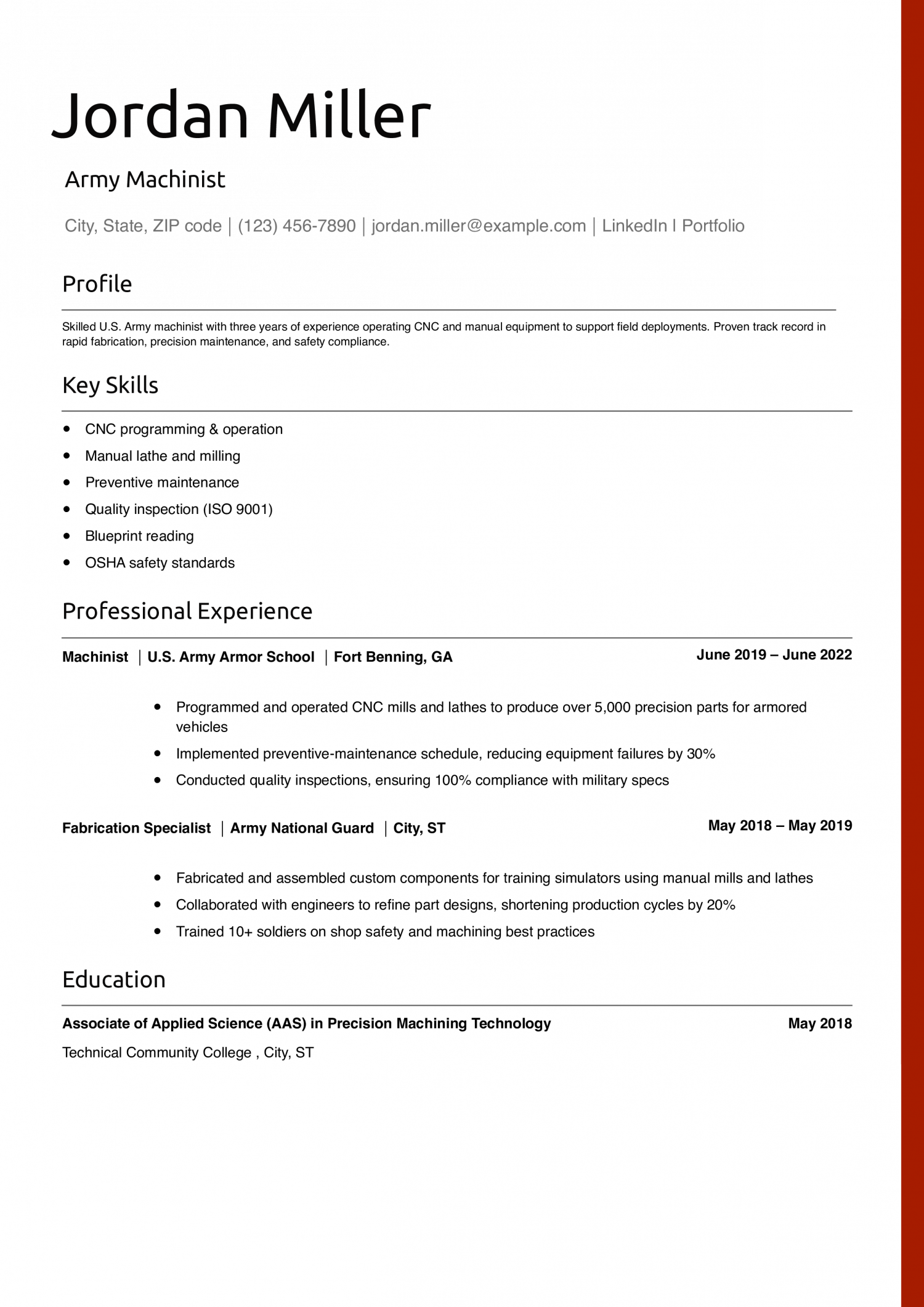
Why This Resume Is a Great Example
Jordan’s resume ties precise machining metrics — like “5,000 parts produced” and “30% fewer failures” — to mission readiness. The inclusion of ISO/OSHA compliance highlights professionalism relevant to civilian manufacturing.
Key Tips
Quantify output and efficiency gains in your role to show technical mastery. For advice on listing specialized equipment skills, consult the Technical Skills in an IT Resume.
Military Police Transition Resume Example
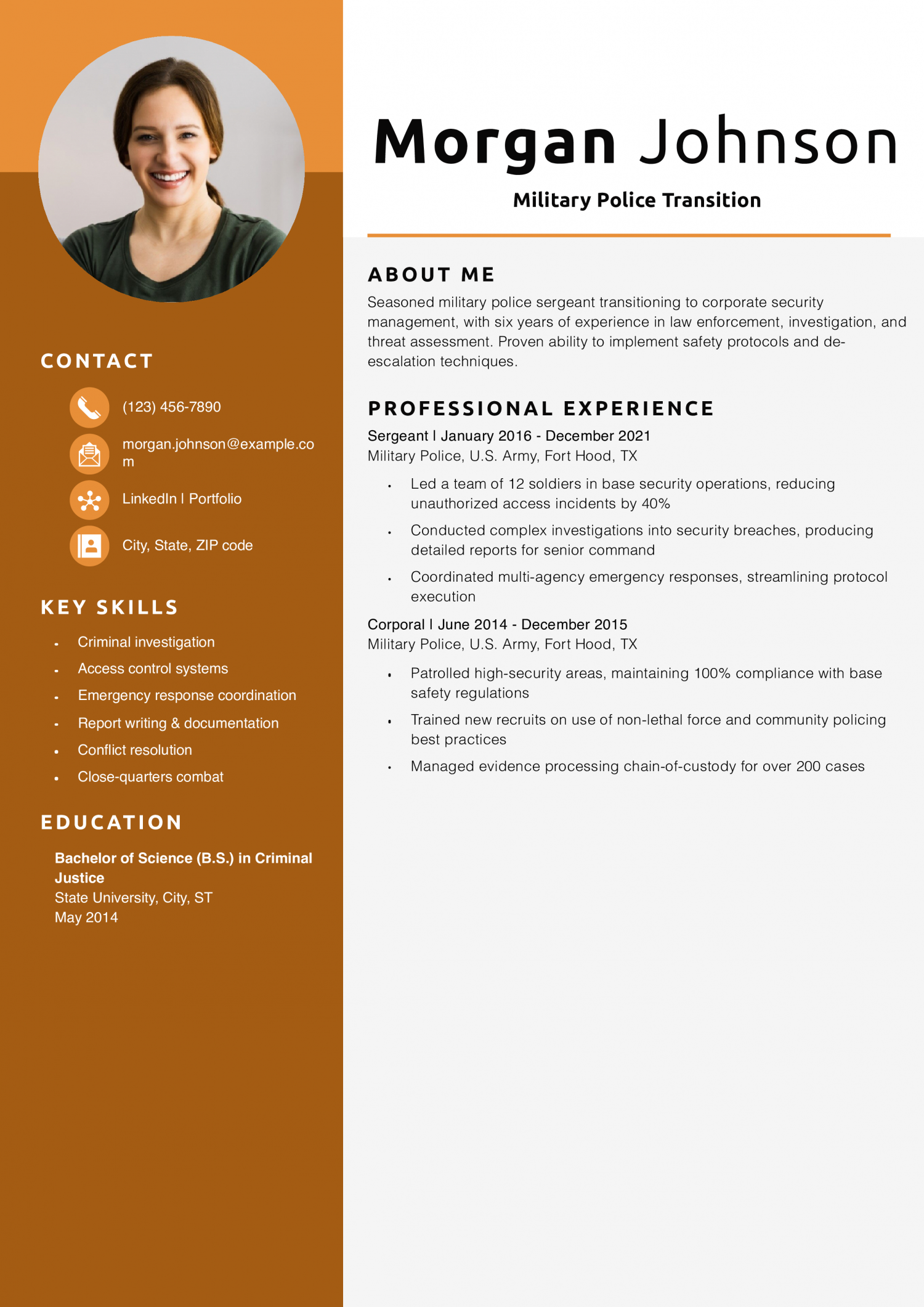
Why This Resume Is a Great Example
Morgan’s resume translates military law-enforcement outcomes, like a 40% reduction in security incidents, into metrics that matter for corporate security roles. The clear progression from corporal to sergeant shows leadership growth.
Key Tips
Show direct security improvements (e.g., “40% fewer unauthorized entries”) to highlight risk-mitigation impact. For tips on presenting enforcement experience, explore Resume Action Words.
Military Logistics Coordinator Resume Example
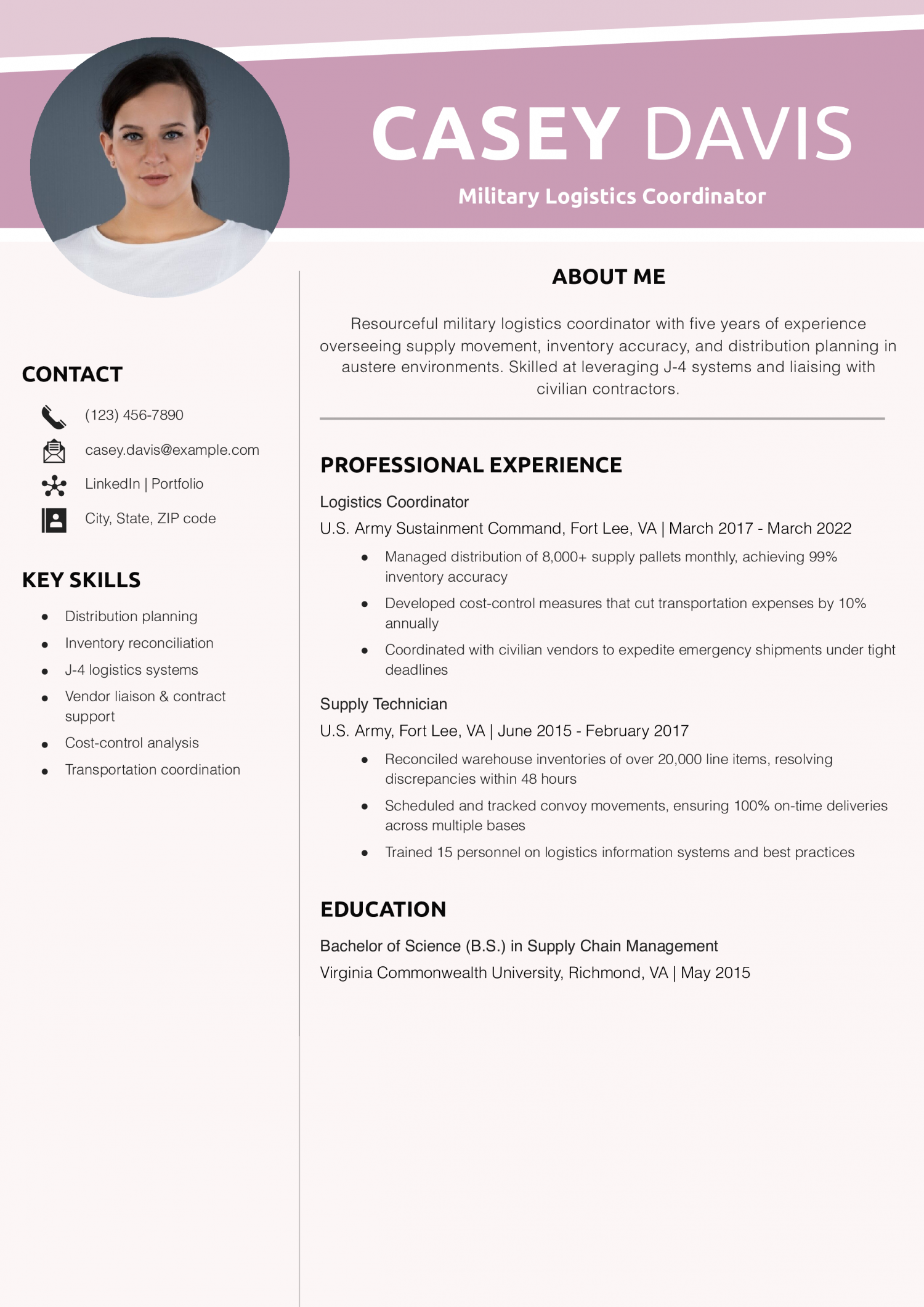
Why This Resume Is a Great Example
Casey’s resume spotlights scale (“8,000 pallets monthly”) and precision (“99% inventory accuracy”) to demonstrate logistics expertise. The vendor-coordination bullet shows civilian-sector readiness.
Key Tips
Include both volume metrics and accuracy rates to convey operational excellence. For more on listing inventory skills, see Resume Keywords.
Intelligence Analyst Resume Example
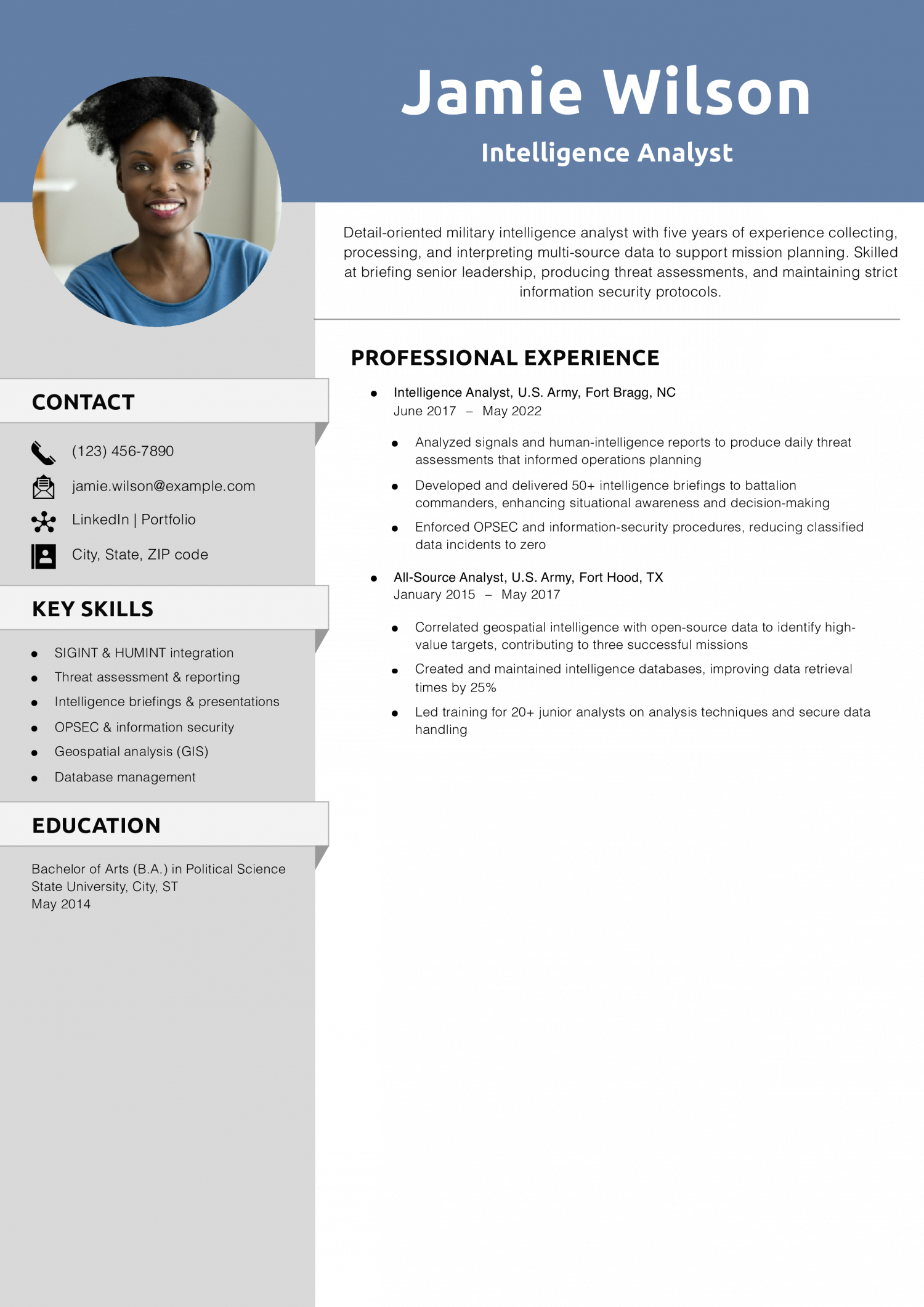
Why This Resume Is a Great Example
Jamie’s resume quantifies analytical and briefing outcomes, such as “50+ intelligence briefings” and “25% faster data retrieval,” demonstrating clear operational value. The emphasis on information security compliance underscores trustworthiness for civilian intelligence roles.
Key Tips
Highlight both the volume and impact of your analytical work to show depth of expertise. For more on presenting specialized capabilities, check out Hard Skills for a Resume.
Cybersecurity Specialist Resume Example
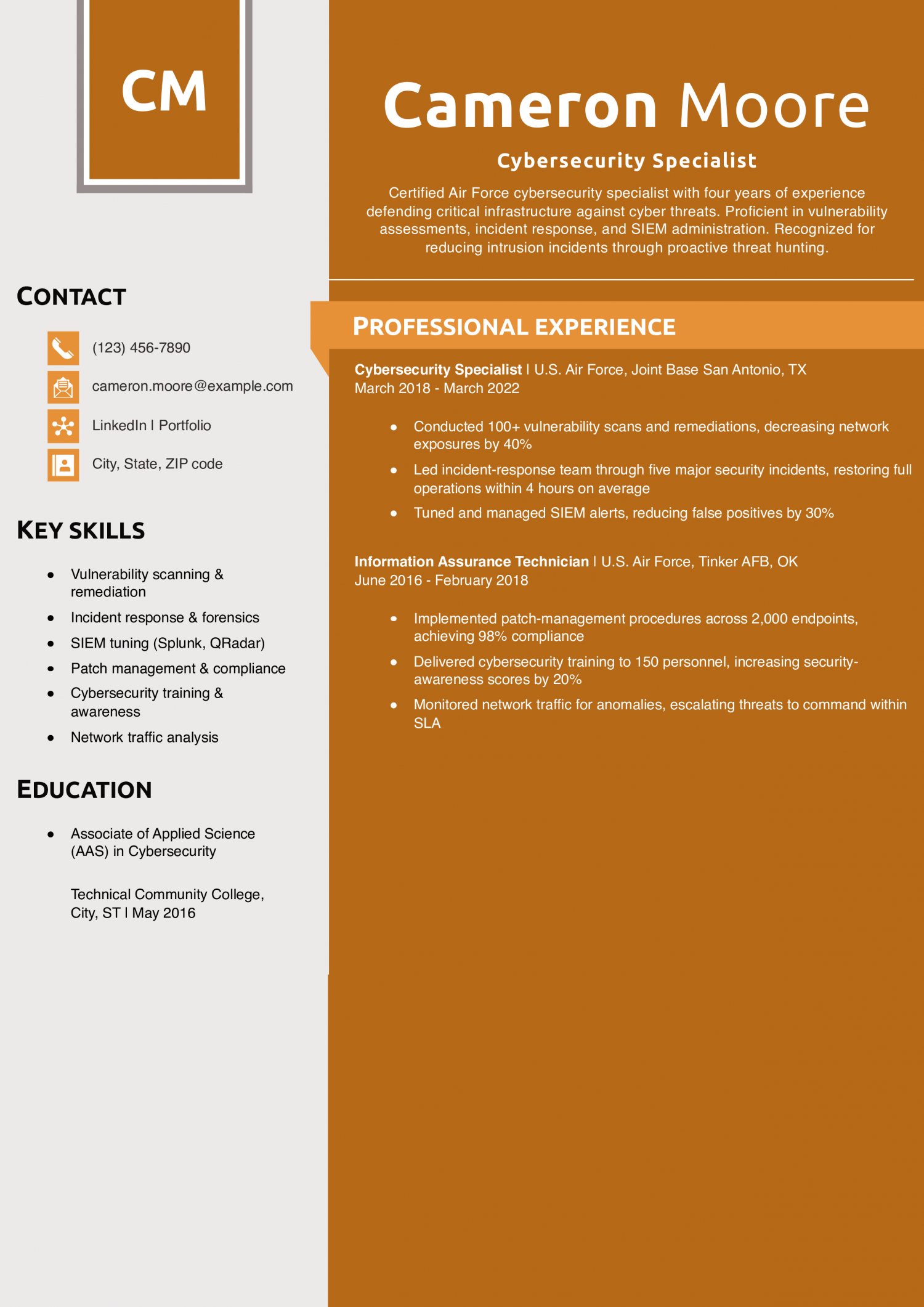
Why This Resume Is a Great Example
Cameron’s resume ties clear metrics — like “40% fewer exposures” and “4-hour incident resolution” — to mission impact, showcasing both technical and leadership strengths. The blend of proactive scanning and reactive response highlights full-cycle cybersecurity expertise.
Key Tips
Quantify your security improvements and response efficiency to convey impact in civilian roles. For guidance on highlighting technical proficiencies, see Technical Skills in an IT Resume.
Navy Logistics Officer Resume Example
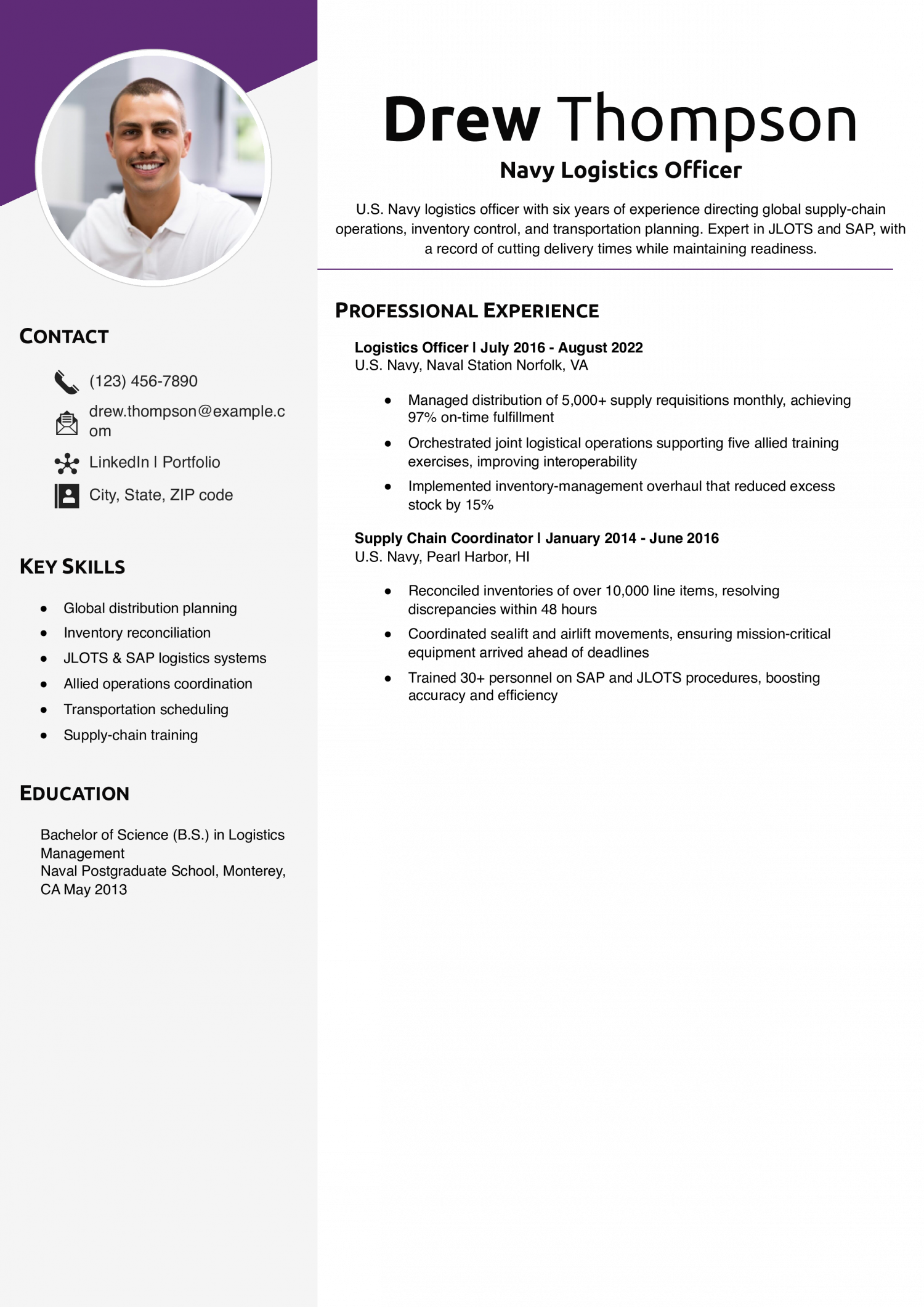
Why This Resume Is a Great Example
Drew’s resume emphasizes both scale (“5,000 requisitions monthly”) and efficiency gains (“15% less excess stock”), demonstrating impactful logistics leadership. The joint-exercise planning bullet speaks to cross-functional and international collaboration.
Key Tips
Use precise metrics for distribution volume and inventory reductions to showcase logistical expertise. For tips on translating military logistics to civilian roles, see Transferable Skills Resume.
Marine Corps Project Manager Resume Example
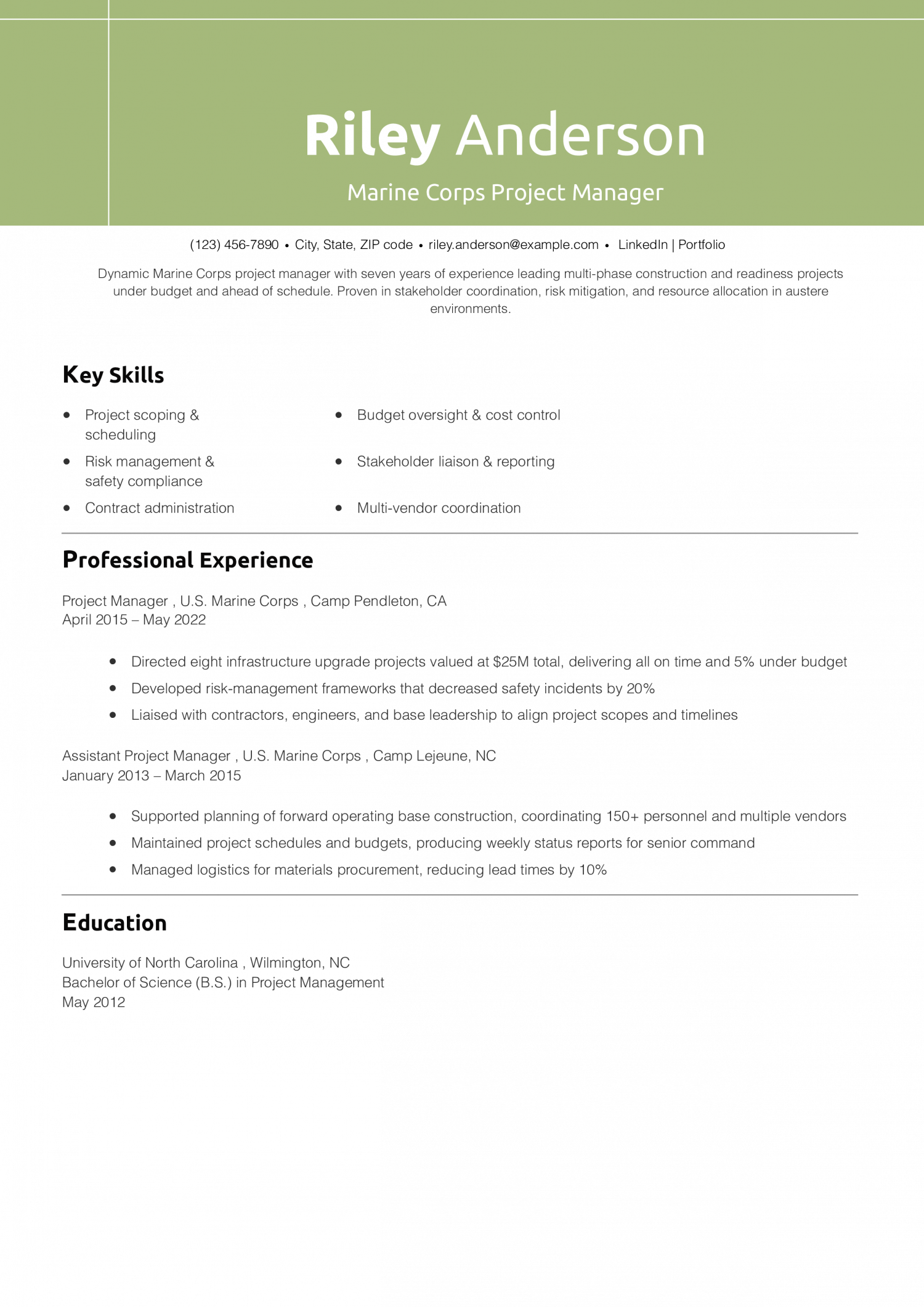
Why This Resume Is a Great Example
Riley’s resume quantifies both financial (“$25M under budget”) and safety outcomes (“20% fewer incidents”), illustrating balanced project leadership. The transition-ready terminology (project scopes, risk frameworks) translates directly to civilian PM roles.
Key Tips
Highlight budget control and safety improvements with percentages to demonstrate project impact. For more on presenting PM achievements, check Best Resume Formats.
Coast Guard Search & Rescue Coordinator Resume Example
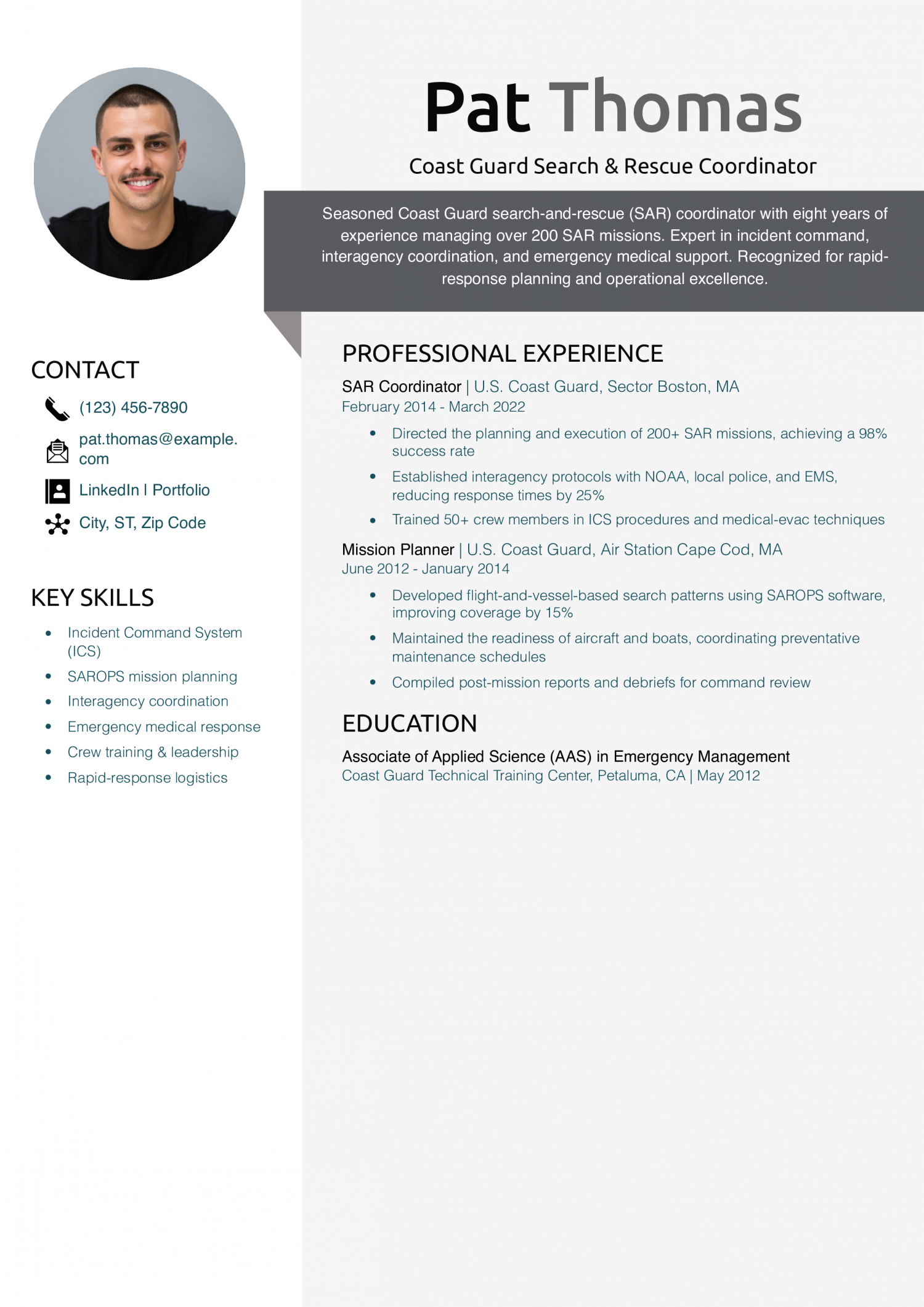
Why This Resume Is a Great Example
Pat’s resume conveys high-stakes leadership, such as “200+ missions,” “98% success rate,” and “25% faster responses,” demonstrating clear operational impact. The interagency collaboration bullet shows the ability to coordinate across civilian organizations.
Key Tips
Use mission-success metrics and coordination outcomes to highlight leadership in emergencies. For advice on detailing field operations roles, see Work Experience on a Resume.
Military Police Officer Resume Example
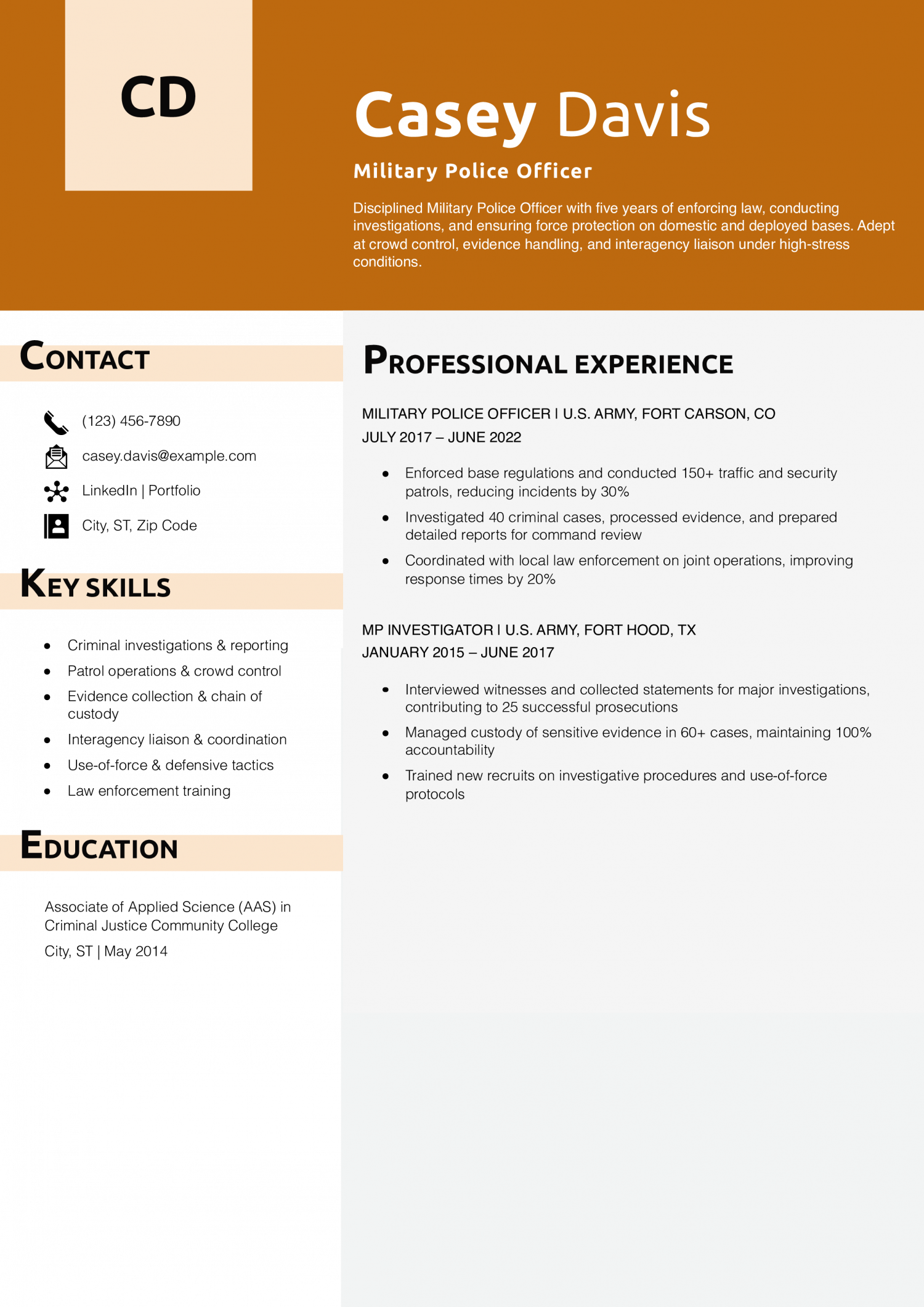
Why This Resume Is a Great Example
Casey’s resume quantifies patrol and investigative outcomes—“150+ patrols” and “25 prosecutions”—showing concrete law-enforcement impact. The interagency coordination bullet signals readiness to collaborate with civilian police agencies.
Key Tips
Emphasize both enforcement and investigative metrics to illustrate the breadth of experience. For advice on translating military investigations to civilian roles, see Resume Keywords For Your Resume.
Army Combat Engineer Resume Example
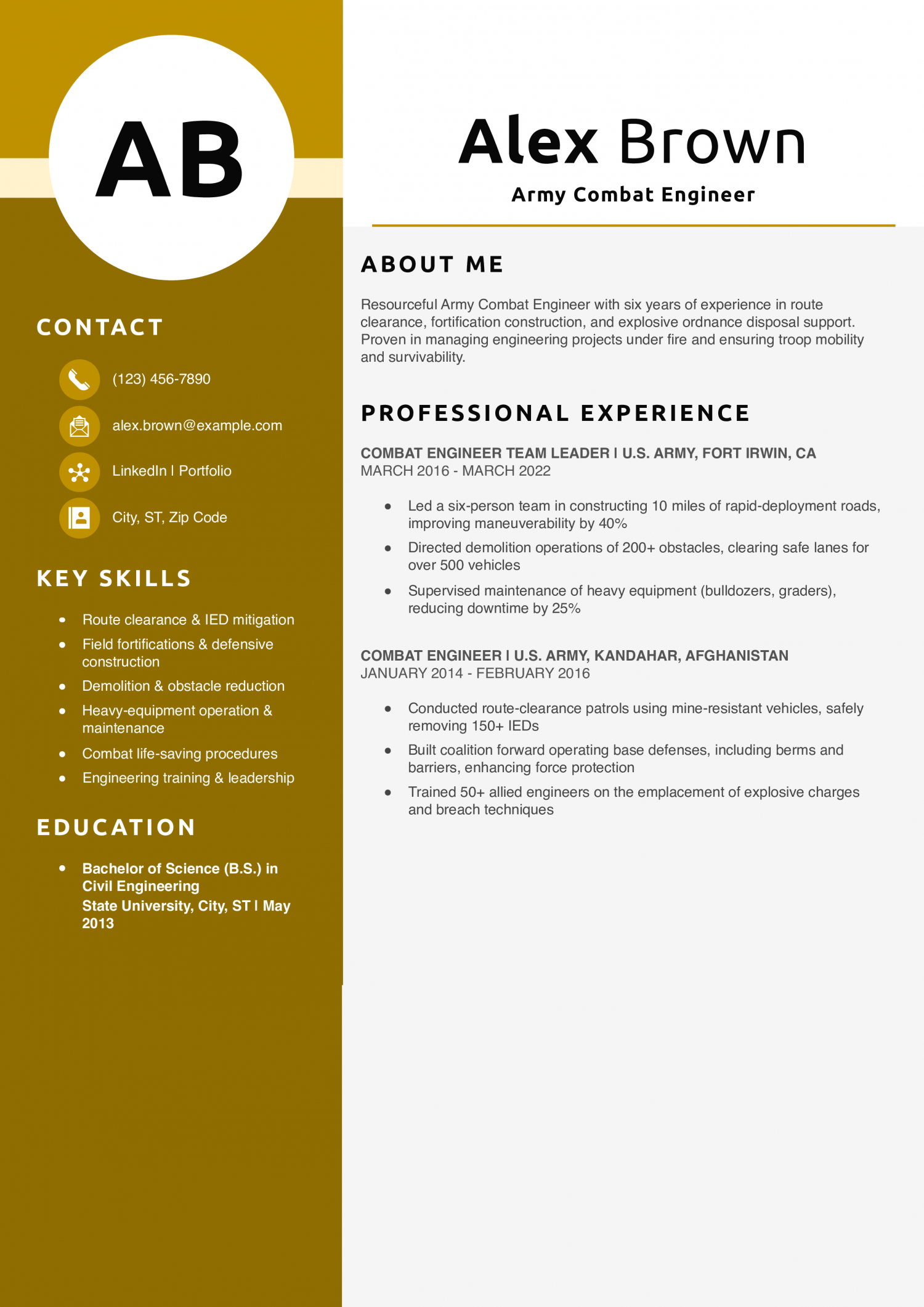
Why This Resume Is a Great Example
Alex’s bullets highlight mission-critical engineering achievements, such as “10 miles of roads” and “150+ IEDs cleared,” demonstrating both leadership and technical skills. The emphasis on equipment maintenance readiness shows operational reliability.
Key Tips
Show both construction outputs and safety metrics to underscore engineering impact. For more on presenting technical achievements, consult the Core Competencies Resume.
Air Force Security Forces Patrolman Resume Example
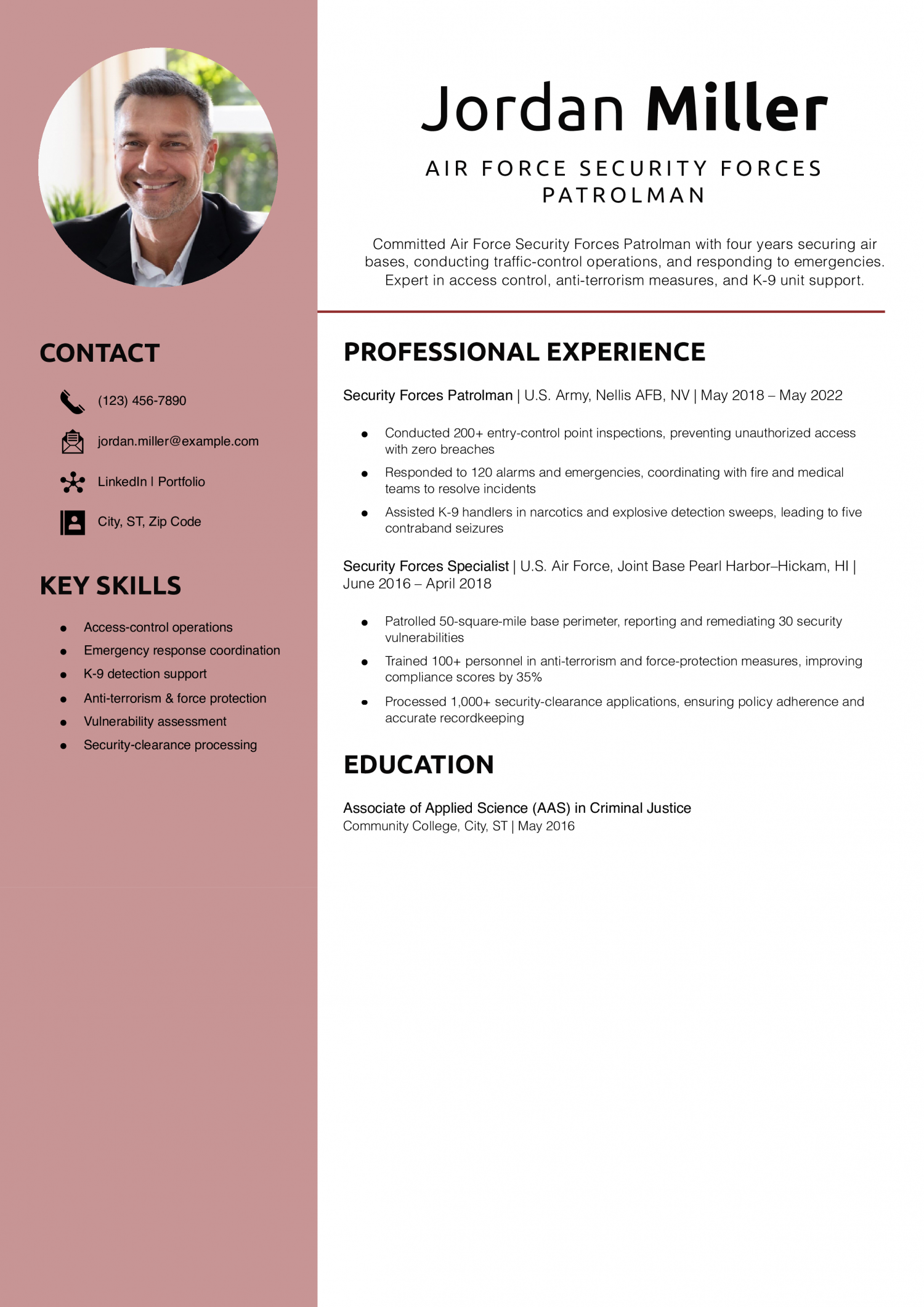
Why This Resume Is a Great Example
Jordan’s resume quantifies both prevention (“200+ inspections”) and response (“120 emergencies”), illustrating well-rounded security expertise. The K-9 collaboration bullet underscores teamwork and specialized support skills.
Key Tips
Highlight both preventive and reactive security operations to showcase comprehensive capability. For more on listing security proficiencies, see What to Put on a Resume.
Navy Supply Corps Officer Resume Example
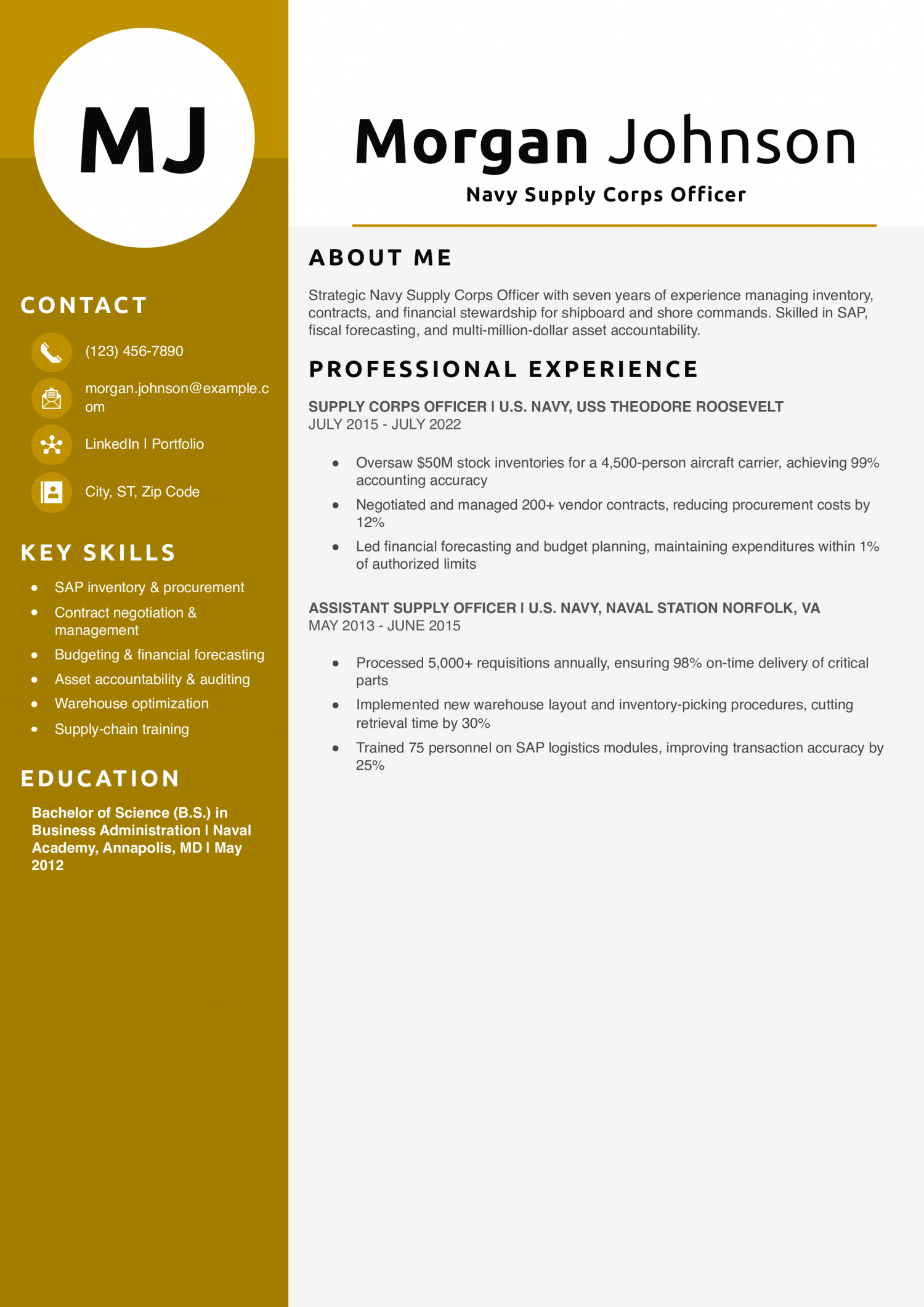
Why This Resume Is a Great Example
Morgan’s resume emphasizes both fiscal stewardship (“within 1% of limits”) and inventory accuracy (“99% accounting”), demonstrating trusted supply-chain leadership. The warehouse overhaul bullet shows process-improvement capability.
Key Tips
Use precise financial and inventory metrics to convey supply-chain impact. For more on presenting budgeting achievements, check Best Resume Formats.
Marine Corps Infantry Squad Leader Resume Example
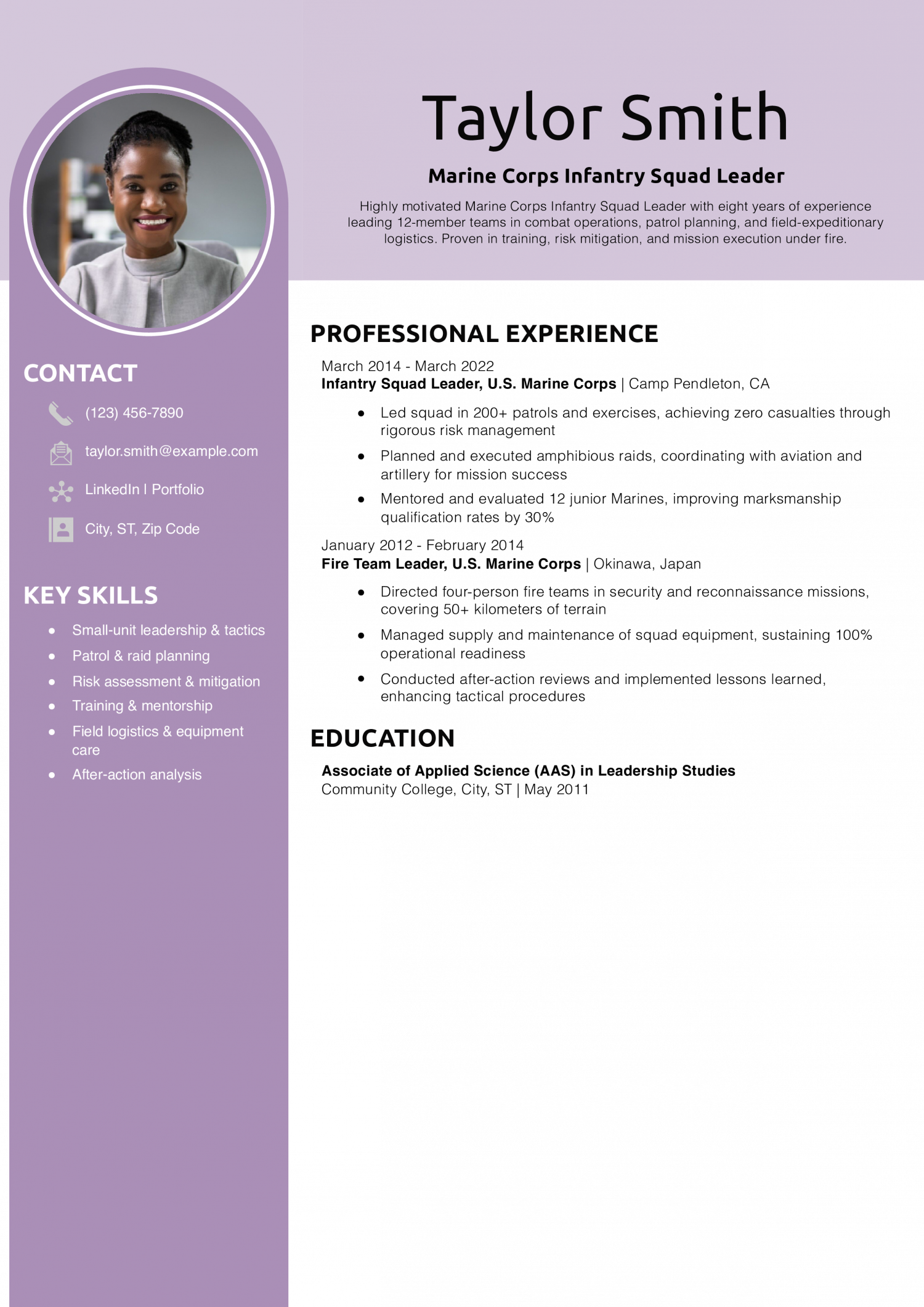
Why This Resume Is a Great Example
Taylor’s resume uses mission success metrics — “200+ patrols,” “0 casualties,” “30% better marksmanship” — to illustrate leadership and training efficacy. The logistical-readiness bullet underscores resource-management strengths.
Key Tips
Detail both tactical outcomes and mentorship achievements to show balanced leadership. For more on crafting strong action statements, see Resume Action Words.
Military Logistics Specialist Resume Example
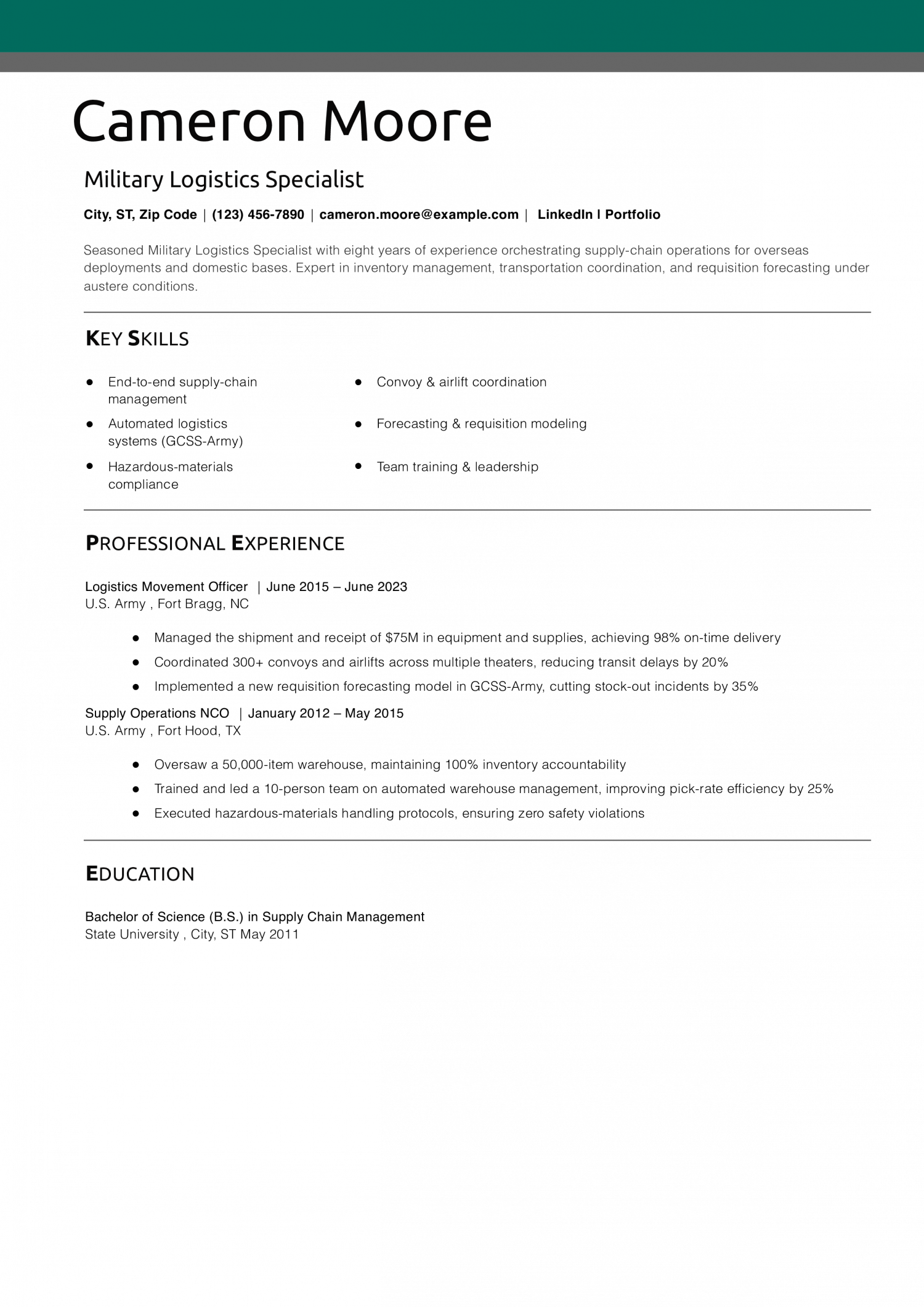
Why This Resume Is a Great Example
Cameron’s resume quantifies both high-value shipments (“$75M”) and process improvements (“35% fewer stock-outs”), demonstrating measurable logistics impact. The convoy coordination metric highlights operational agility.
Key Tips
Emphasize end-to-end metrics—dollar values and percentage gains—to show business relevance. For more on translating military logistics skills, see Transferable Skills Resume.
Air Force Civil Engineer Resume Example
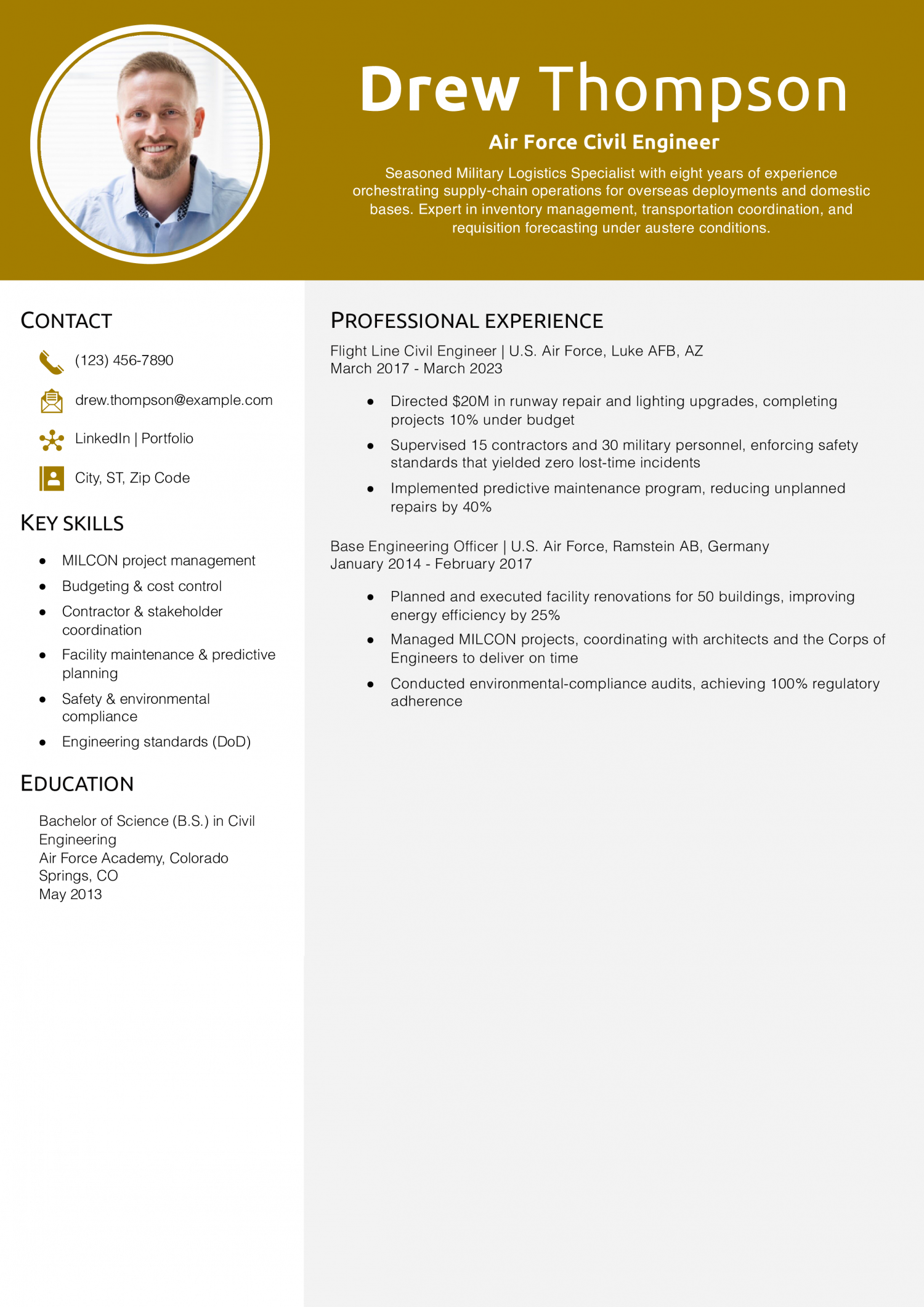
Why This Resume Is a Great Example
Drew’s resume highlights both financial stewardship (“10% under budget”) and safety performance (“zero incidents”), underlining reliable project and personnel management. The maintenance-reduction metric shows proactive planning.
Key Tips
Quantify project scale and safety outcomes to showcase leadership in engineering. For guidance on civilianizing engineer resumes, check Best Resume Formats.
Army Intelligence Analyst Resume Example
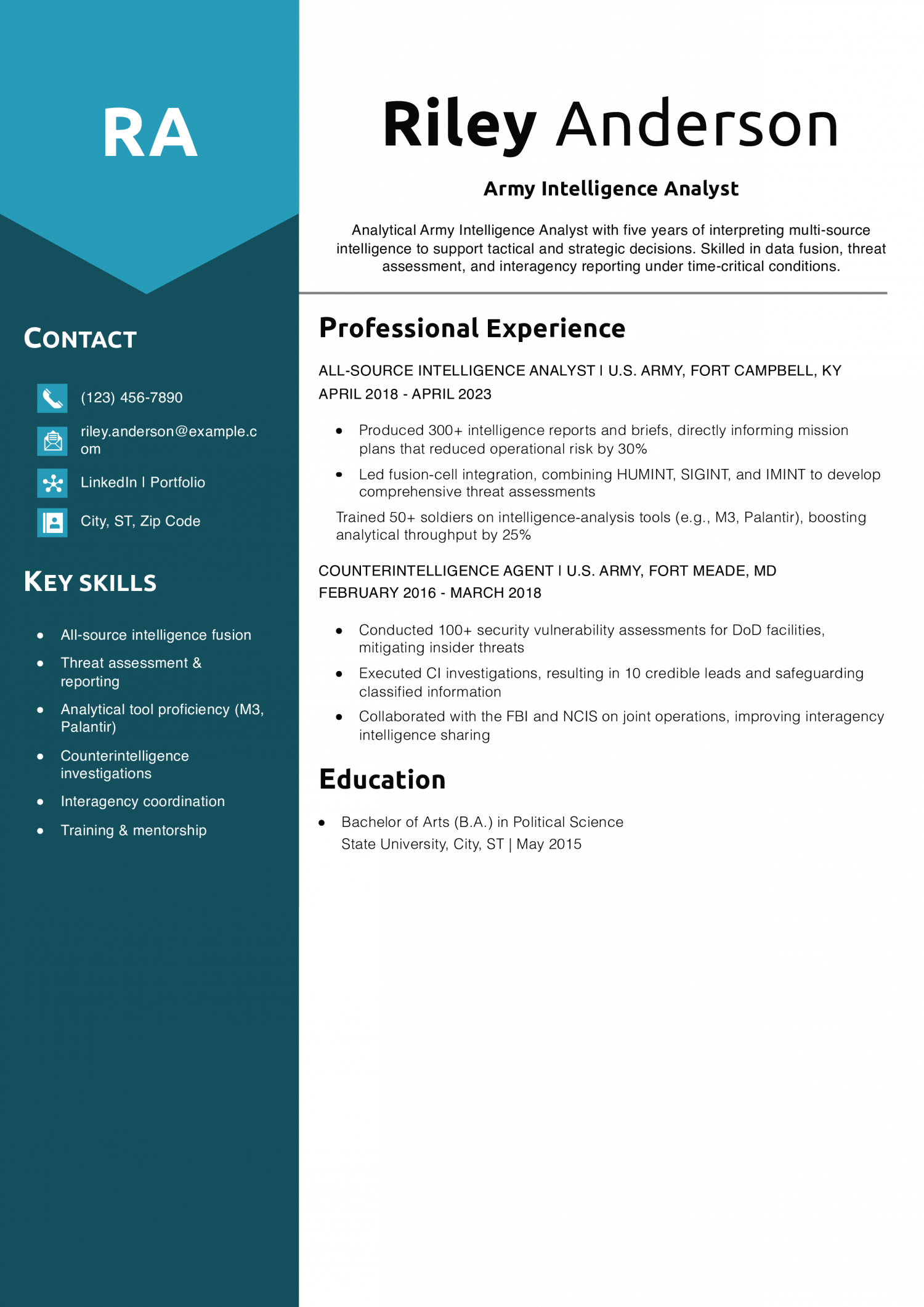
Why This Resume Is a Great Example
Riley’s resume demonstrates direct mission impact, such as “30% risk reduction” and interagency cooperation, conveying adept intelligence integration. The training bullet shows the capacity to scale analytical capabilities.
Key Tips
Highlight both analytic outputs and collaborative investigations to illustrate comprehensive intel skills. For more on listing analysis tools, see Technical Skills in an IT Resume.
Navy Lieutenant to Project Manager Resume Example
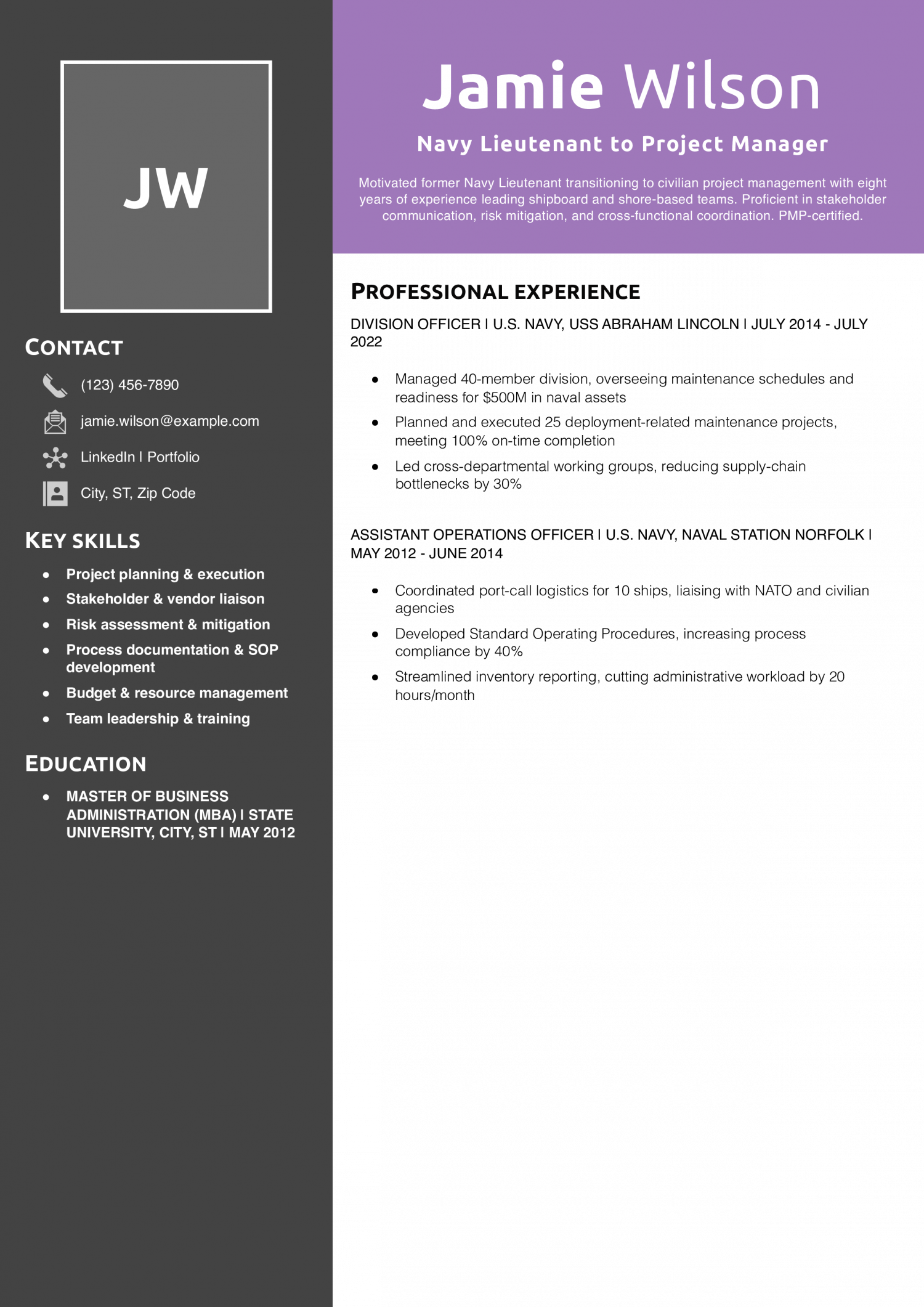
Why This Resume Is a Great Example
Jamie’s resume bridges military leadership with civilian project metrics like “25 projects on time” and “30% fewer bottlenecks,” showing transferable PM skills. PMP certification reinforces formal qualifications.
Key Tips
Translate military logistics and SOP development into civilian project-management language. For help, see Job Title Examples for Your Resume.
Veteran Transition Resume Example
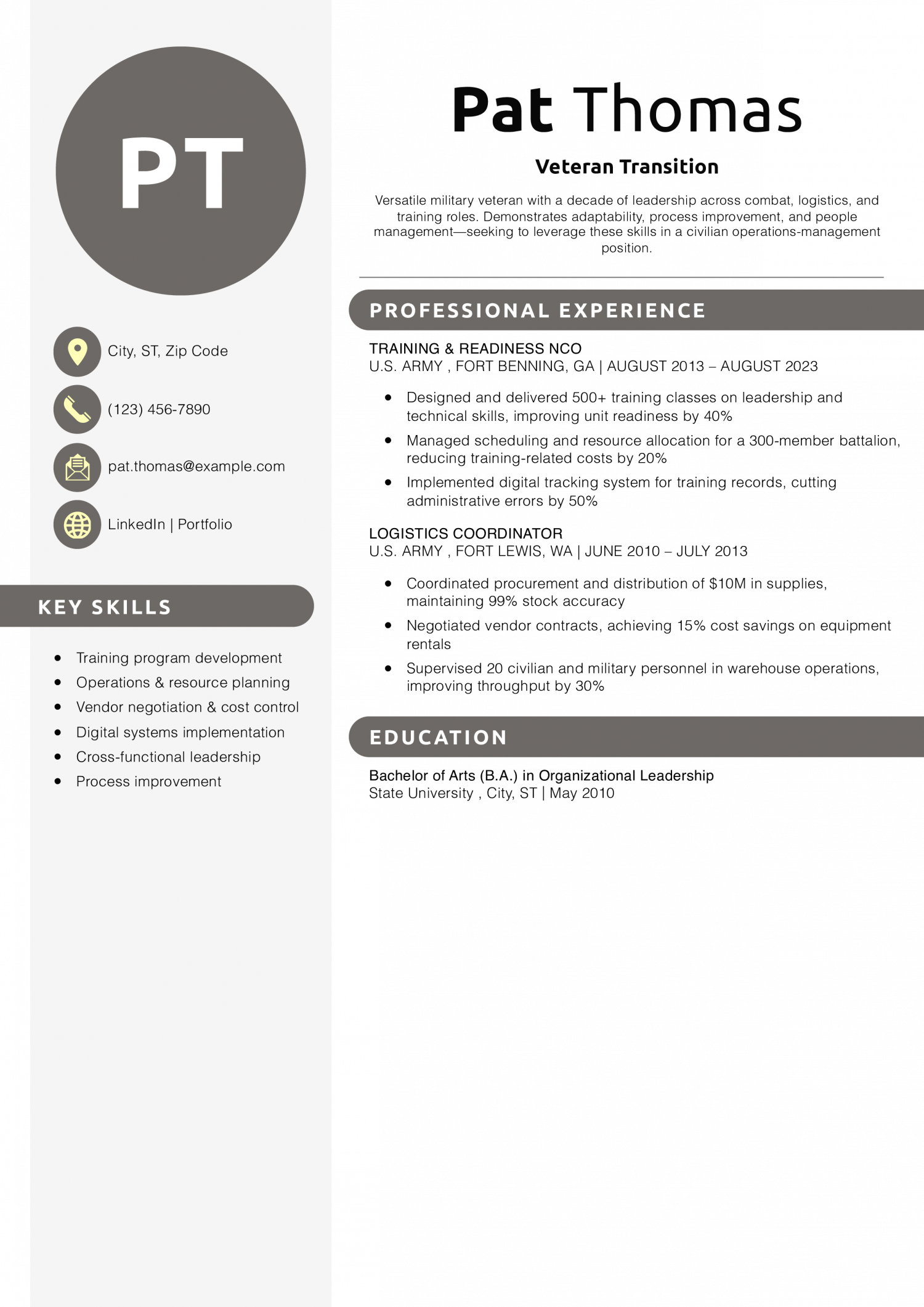
Why This Resume Is a Great Example
Pat’s resume quantifies training impacts (“40% readiness gain”) and logistics performance (“99% accuracy,” “30% throughput rise”), demonstrating versatile operational leadership. The digital-system bullet shows tech adaptability.
Key Tips
Showcase broad leadership metrics and cost savings to appeal to civilian employers. For more on military-to-civilian transitions, visit How to Tailor a Resume to a Job Description.
Military Text-Only Resume Examples and Templates
How To Write a Military Resume Example
Using a resume template can help you write an effective military resume. Your resume should include these sections:
- Contact information
- Profile
- Key skills
- Professional experience
- Education and certifications
1. Share your contact information
Provide your full name, phone number, email address, location, and a link to your online professional profile. Ensure your contact information is current so potential employers can contact you for an interview.
Example
Cameron Malfara | (123) 456-7890 | [email protected] | LinkedIn | Portfolio
2. Create a compelling profile summarizing your military qualifications
The profile of your military resume should present an engaging case to hiring managers by summarizing your military career. Include your job title, years of experience, knowledge, and any specializations that set you apart. Within a few sentences, show that you match key aspects of the job’s requirements.
Senior-Level Profile Example
Accomplished senior strategist with deep experience in public safety and community well-being gained from notable roles at the Department of Homeland Security and Federal Emergency Management Agency (FEMA). Strategic thinker responsible for developing and overseeing security protocols and operational risk management assessments. Leader of a multidisciplinary team to facilitate smooth operations.
Entry-Level Profile Example
Diligent military professional with hands-on experience in basic training, military equipment maintenance, and security duties. Delivers well-informed strategies for disaster preparedness, emergency management, and security threats assessment.
3. Write a success-driven professional experience section
To create an effective professional experience section, clearly outline your career trajectory in the military arena. Start with your most recent position first and work backward, sharing skills such as combat training and piloting vehicles, along with credentials like Certified Professional Logistician (CPL). Include key details that align with the job you’re applying for. When you can, use numbers to measure and give value to your duties and accomplishments.
Senior-Level Professional Experience Example
Director of Strategic Planning | April 2010 – present
Department of Homeland Security | Washington, D.C.
- Leads the strategic planning division staff of 65, aligning Homeland Security’s objectives with national security priorities, working with a $20-million budget
- Liaise with military and government officials to address and mitigate national threats and risks efficiently, resulting in 15% improved response time
- Oversee the design and execution of comprehensive training programs focused on strategic planning, threat assessment, resource allocation, and security protocols
- Present protocols to senior leadership and collaborate across departments to ensure compliance
Entry-Level Professional Experience Example
Military Operations Specialist | June 2022 – present
Department of Homeland Security | Washington, D.C.
- Assisted in devising and executing tactical strategies, contributing to the formulation of operational orders and contingency planning
- Develop, implement, and oversee emergency response plans for various disaster scenarios, expediting response time by 15%
- Coordinate with multi-disciplinary teams to ensure consistent, concise communication and collaboration
Resume writer’s tip: Quantify your experience
Use numbers and metrics to show the results you achieved in previous military roles. Provide context to your work history and give recruiters a better understanding of your scope and impact. You can demonstrate your value and potential by detailing how you implemented a vehicle maintenance tracking program that reduced downtime by 20% or recovered over $2 million of surplus equipment.
Do
- “Negotiated supplier contracts to achieve a 10% cost reduction for fuel.”
Don’t
- “I work with suppliers on supply pricing to keep costs down.”
4. Include relevant education and certifications
In addition to your education, feature any relevant certifications achieved throughout your military career. Although most employers will be more interested in your professional experience, obtaining other credentials can set your resume apart from other candidates and increase the chance of winning an interview.
Education
Template:
[Degree Name] | [Graduation Year]
[School Name] | [City, State Abbreviation]
Example:
Bachelor of Science (B.S.), Military Science | May 2021
University of Pennsylvania | College Station, PA
Certifications
Template:
[Certification Name] | [Awarding Organization] | [Completion Month and Year]
Examples:
Incident Management Certification | Emergency Management Institute | May 2021
Basic Life Support Certification (BLS) | National CPR Foundation | March 2020
5. List pertinent key skills
Most organizations rely on some form of ATS to identify qualified candidates for job openings. To get your resume through the initial screening process and into the hiring manager’s hands, incorporate keywords from the job description directly into your profile, professional experience, and skills section. Below are key terms and skills that you may encounter while applying for military positions:
| Key Skills and Proficiencies | |
|---|---|
| Analytics | Complex decision-making |
| Continuous improvement | Crisis response |
| Cross-functional leadership | Cybersecurity |
| Database administration | Disaster response and recovery |
| First aid and emergency response | Information technology (IT) |
| Logistics | Navigation and GPS operation |
| Network security | Operations management |
| Process improvement | Project management |
| Resource allocation | Risk mitigation |
| Supply chain management | Team leadership |
| Vulnerability assessment | |
Resume writer’s tip: Use common action verbs
Take a strategic approach with the words you use on your military resume. In the professional experience section of your resume, incorporate action verbs to communicate your job duties and accomplishments. Instead of listing responsibilities, start each section with an engaging verb that shows how you executed critical tasks. Avoid using first-person language such as, “I was responsible for…” Following are some action verbs to liven up your military resume.
| Action Verbs | |
|---|---|
| Administered | Analyzed |
| Conducted | Coordinated |
| Created | Delivered |
| Developed | Diagnosed |
| Evaluated | Executed |
| Identified | Improved |
| Led | Liaised |
| Managed | Oversaw |
| Performed | Provided |
| Supervised | Supported |
| Trained | |
How To Pick the Best Military Resume Template
When selecting your military resume template, prioritize structure and readability over visual appeal. Avoid loud graphics and overbearing colors, and instead, focus on a clean design that showcases your content in an organized way. Hiring managers will always be more interested in your achievements and qualifications than the style of your template.
Frequently Asked Questions: Military Resume Examples and Advice
While the Bureau of Labor Statistics employment projections only cover the civilian workforce, the bureau expects emerging conflicts and global events to drive demand across military branches and organizations. Technology and science are the fastest-growing military career paths, and there is a wide range of combat specialty opportunities. Additionally, there's a growing demand for vehicle and machinery mechanics.
Although these projections are optimistic, you must align your resume with the job description to secure interviews for the most lucrative opportunities. Tailoring your document to individual job postings will significantly increase your chances of landing your next job opportunity.
Reverse chronological format is ideal for most resumes, including those for military professionals. This approach ensures that your most recent and relevant experience is featured at the top of your document and shows your progression in responsibilities and rank. Avoid functional resume formats even at the entry level.
To optimize your Military CV for ATS, make sure to incorporate the right keywords from the job description, especially in sections like skills, experience, and certifications. Stick to a clean, straightforward layout that avoids complicated formatting or images, as these can confuse the ATS. This will help your CV get past the automated systems and into the hands of hiring managers.
Your military resume should demonstrate your skills in combat training, emergency response, operational risk management, and resource allocation. Also, note leadership skills and strategic solution-finding, and bring these soft skills to life with measurables such as reducing vehicle downtime by 15%. Read the job posting for which you are applying to see if you have matching skills. Then incorporate them into your resume, demonstrating how you used them.
Make your military resume stand out by highlighting your expertise, such as overseeing security protocols or managing the distribution of critical military supplies across multiple theater operations. Read the job description for the role you're going after carefully and consider how your experience and expertise align with what the employer is seeking. Incorporate numbers and data, along with keywords that align with the job description. Begin with a compelling profile summary, detail your accomplishments in the professional experience section, list relevant skills, and include your education and certifications.
Check Out Related Examples
Resume Templates offers HR approved resume templates to help you create a professional resume in minutes. Choose from several template options and even pre-populate a resume from your profile.


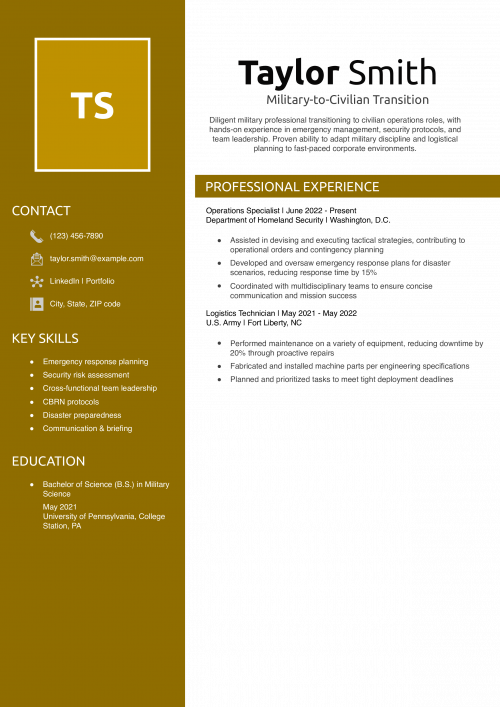
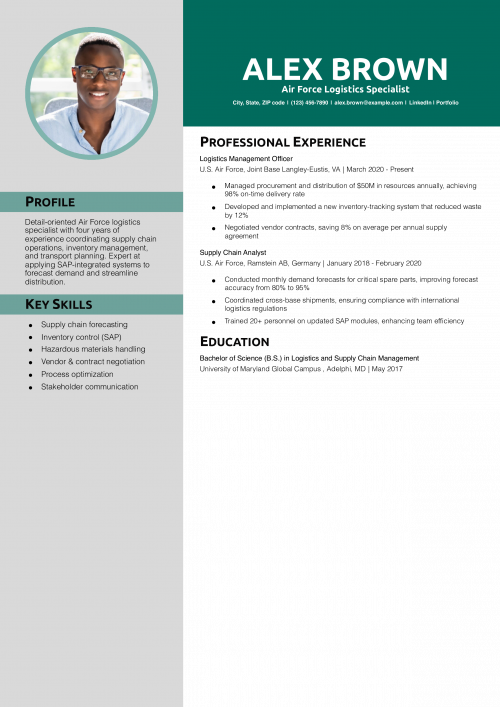
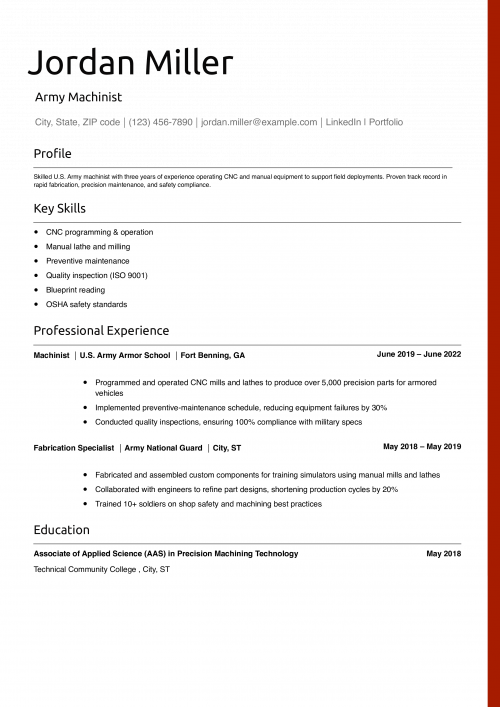
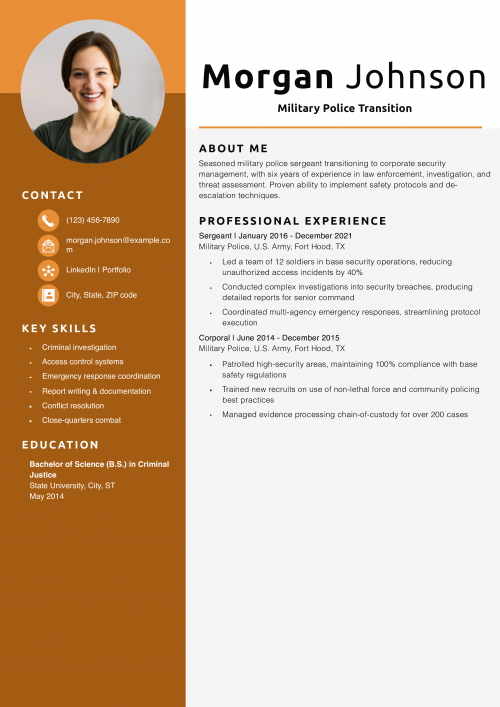
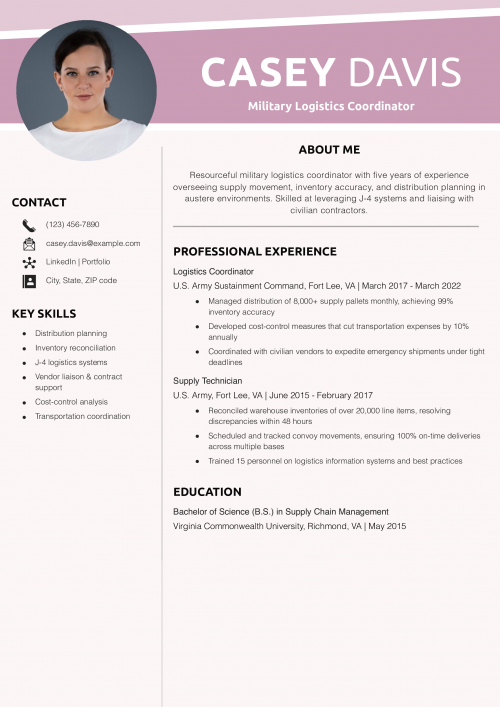
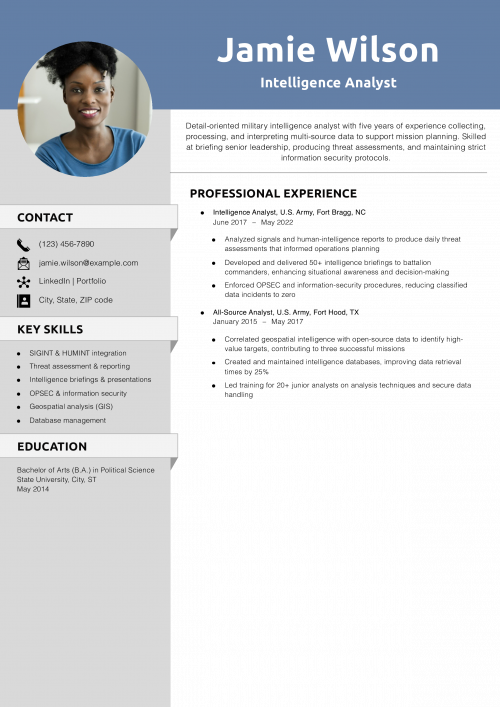
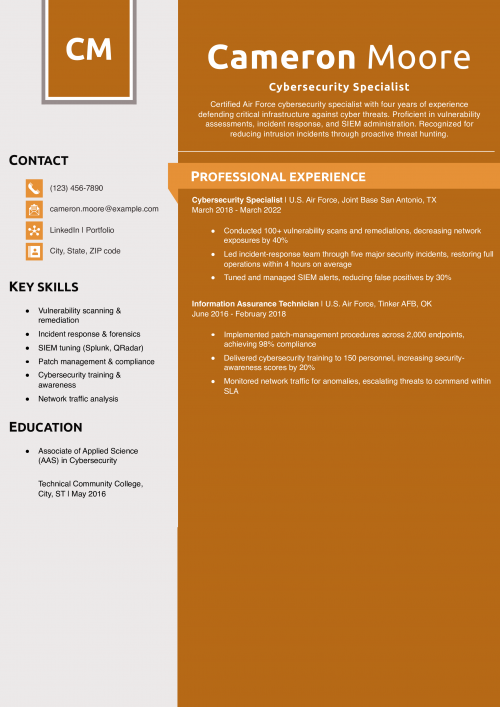
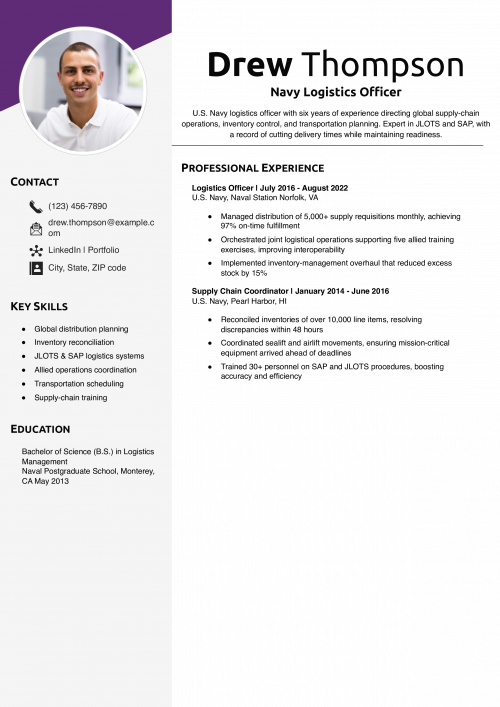
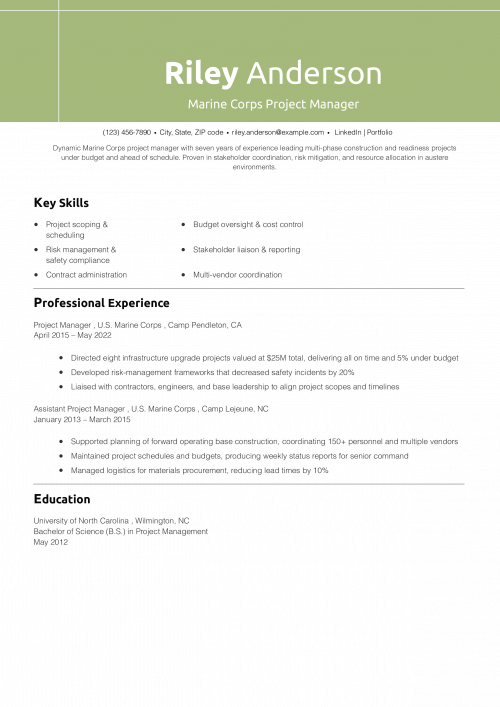
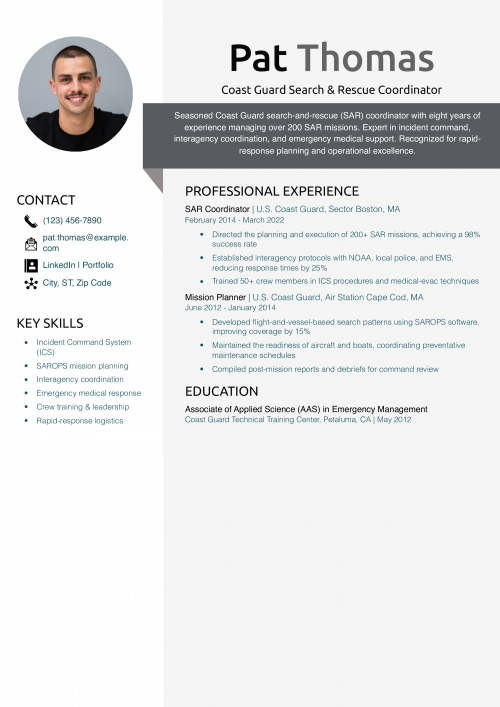
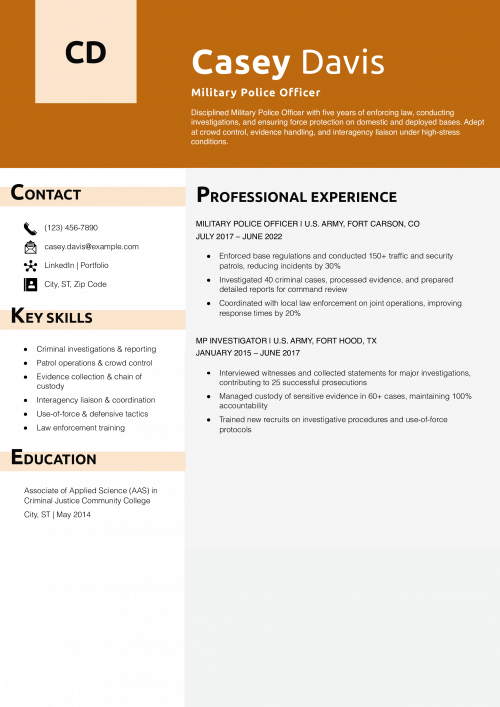
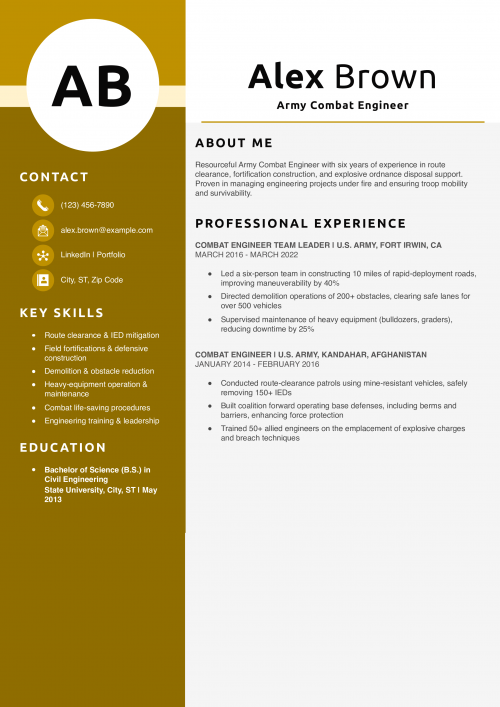
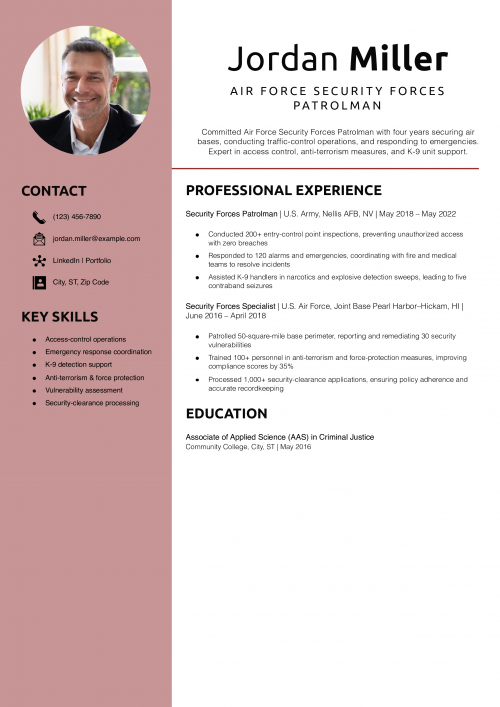
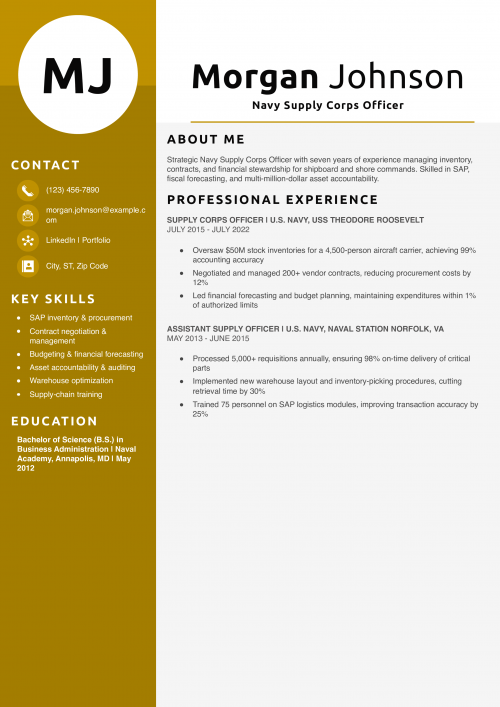
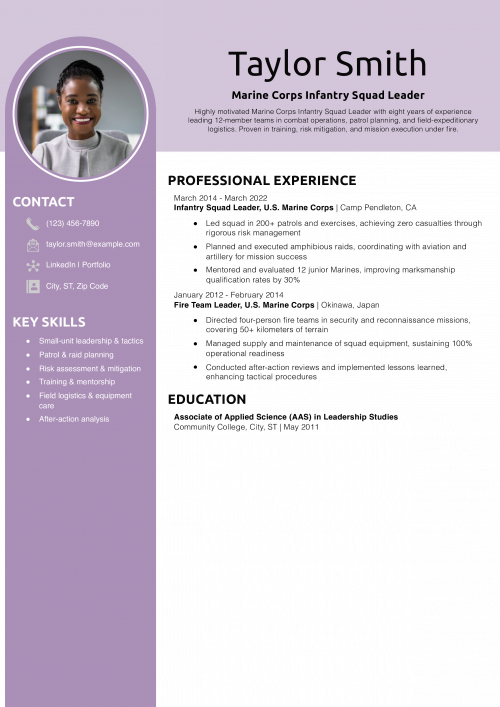
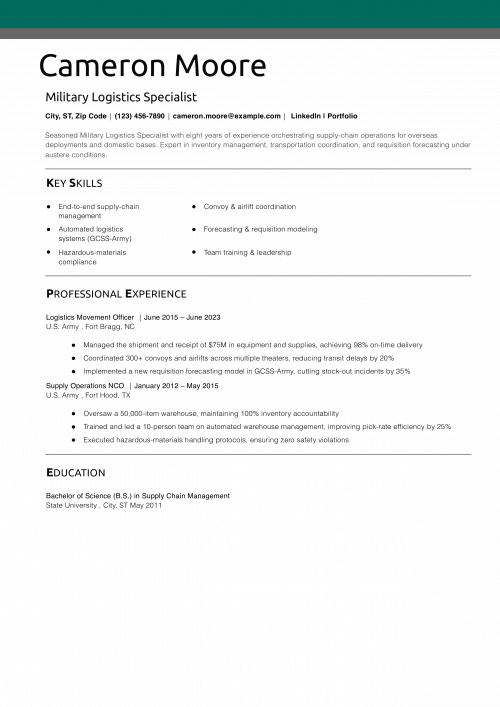
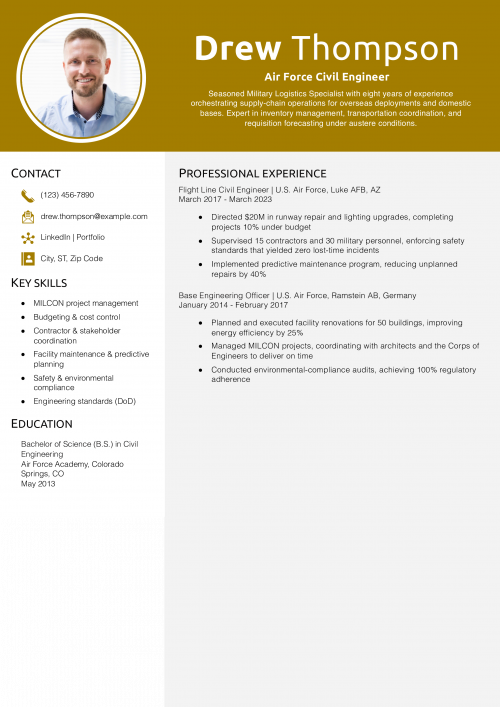
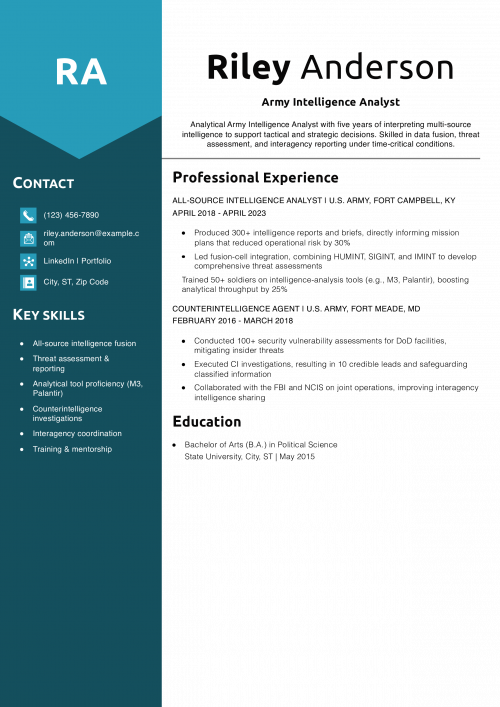
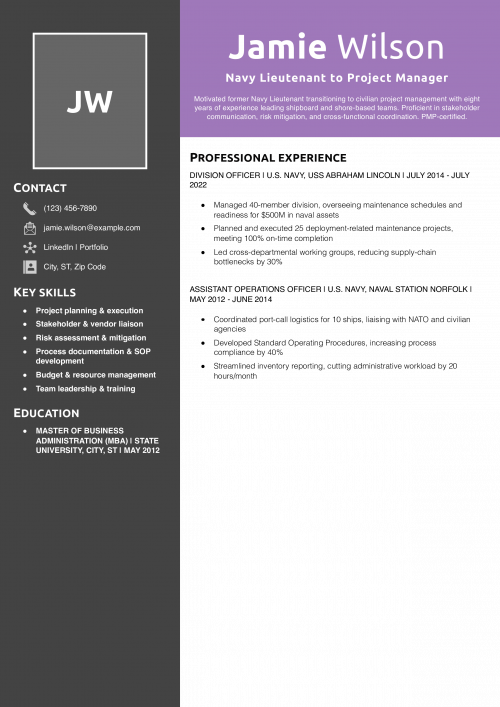
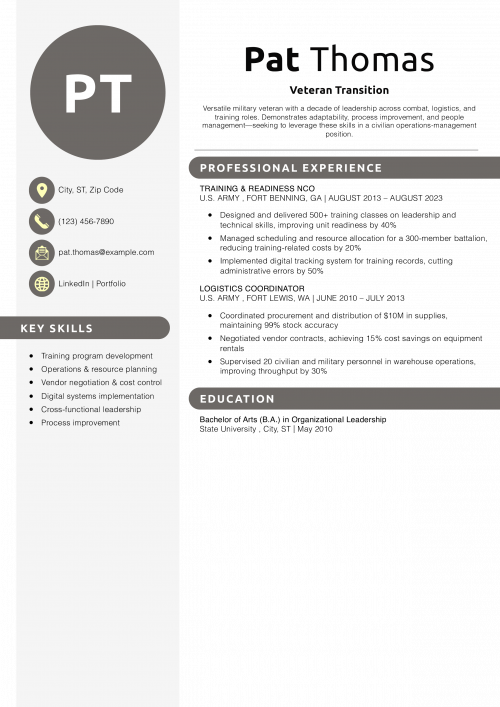

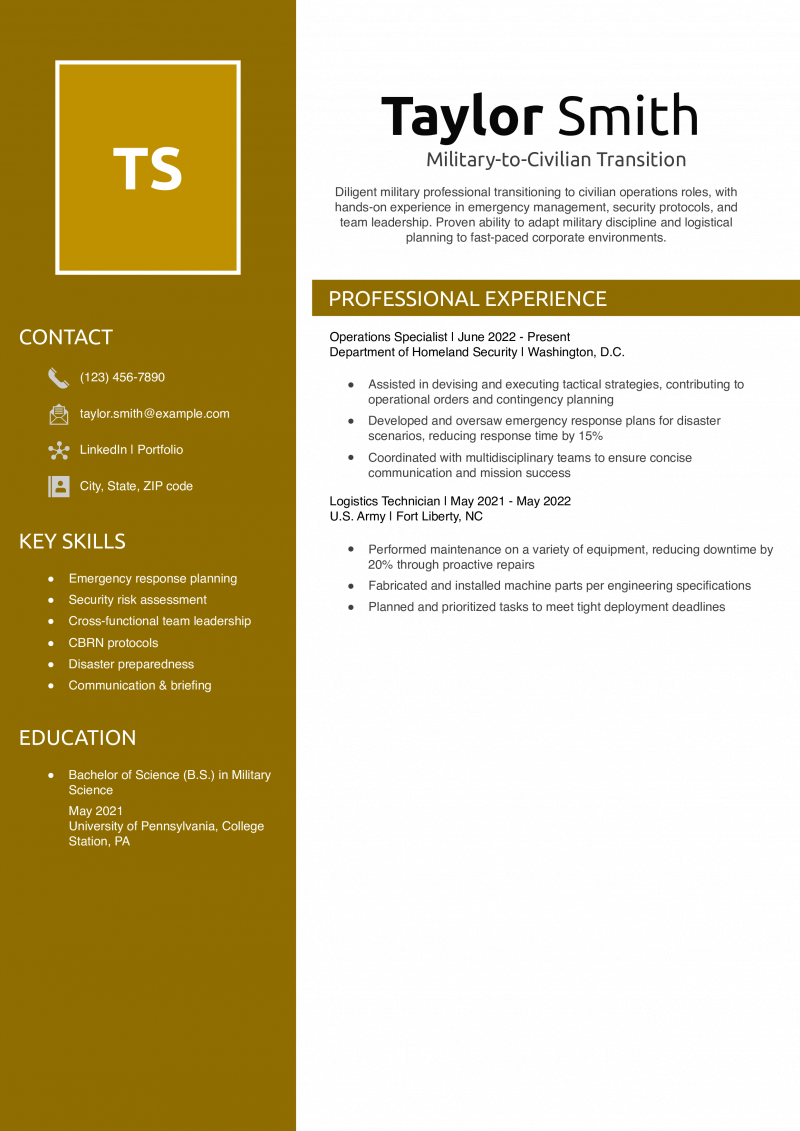
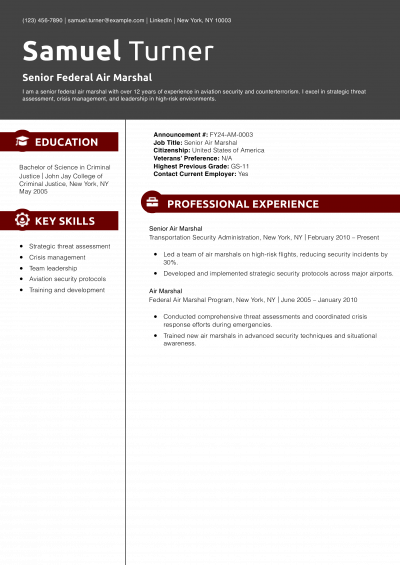

![Tech Resume Templates and Examples for [y]](/wp-content/uploads/2025/02/Mid-Level-Tech-Resume-Example.x400.pdf.jpeg)
